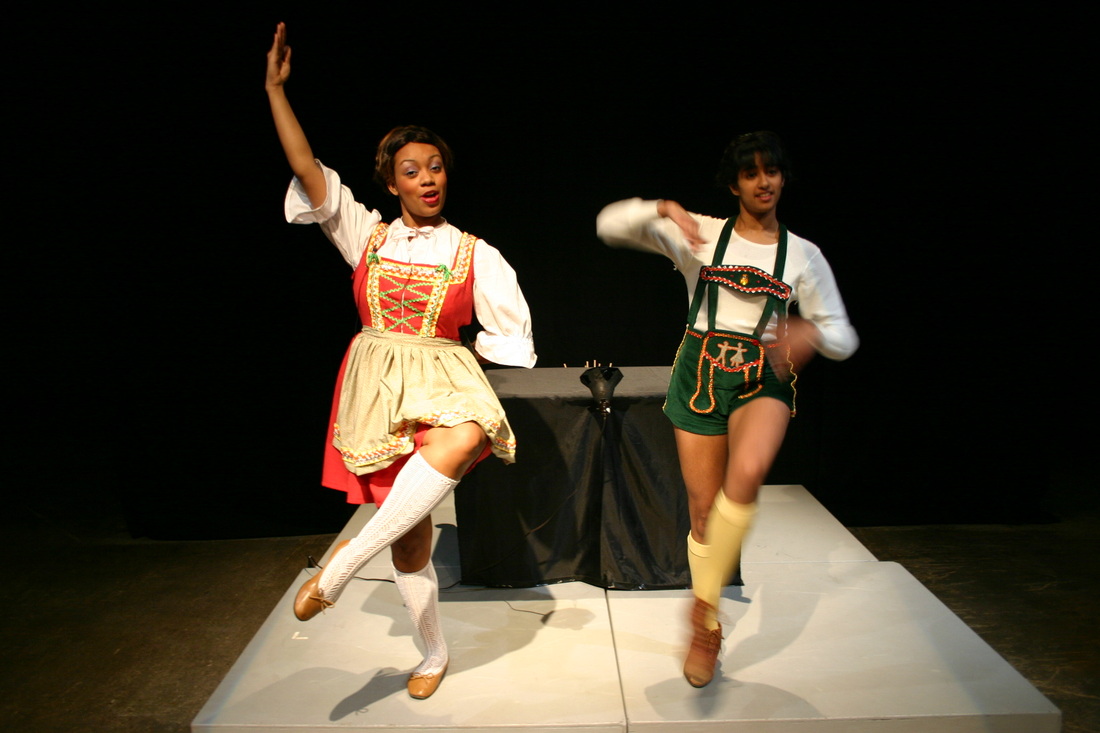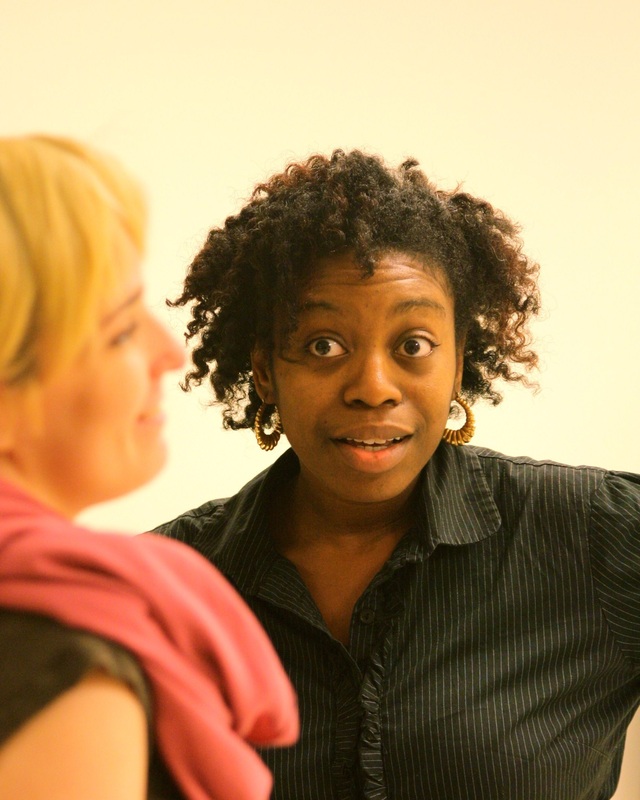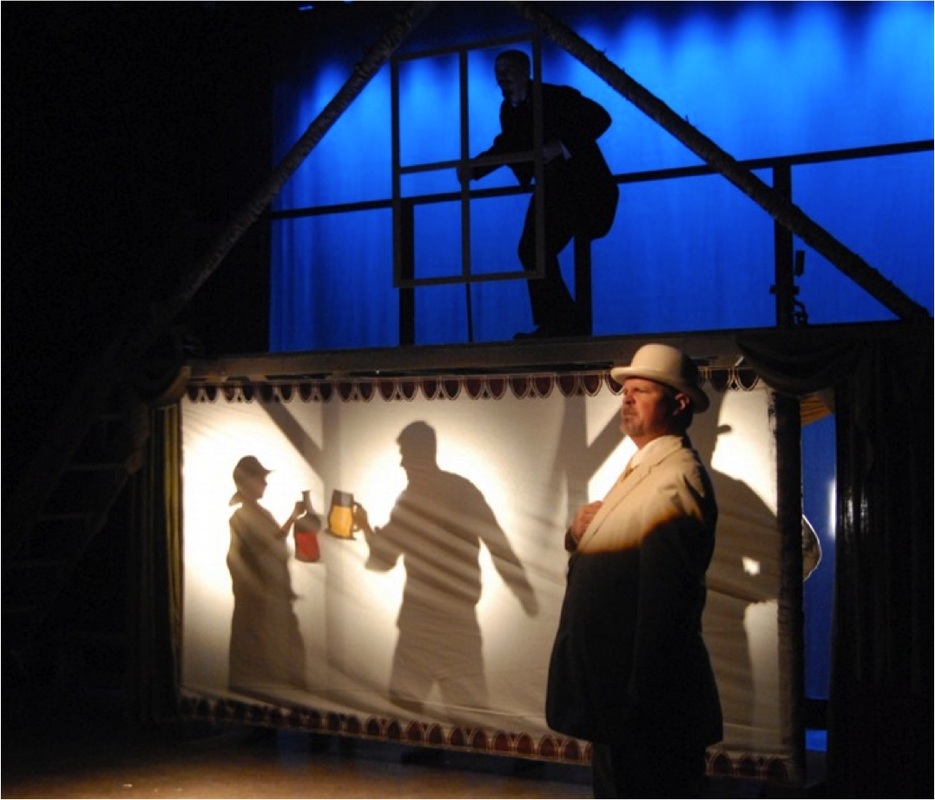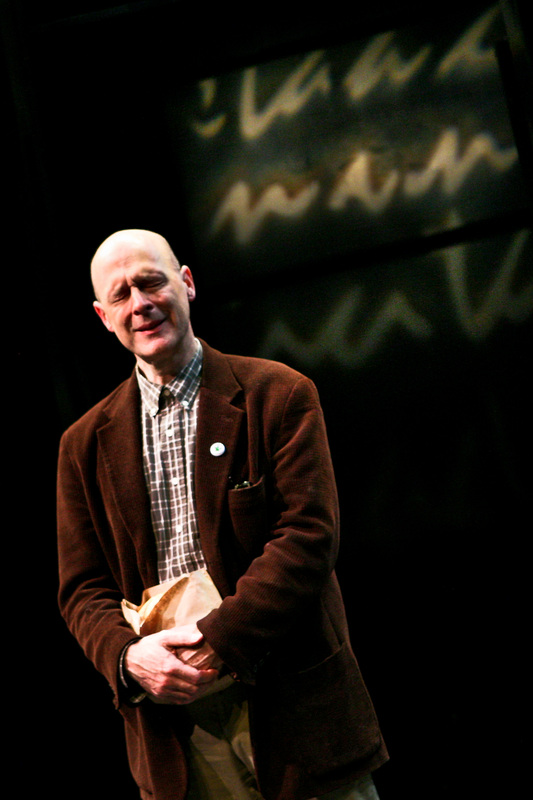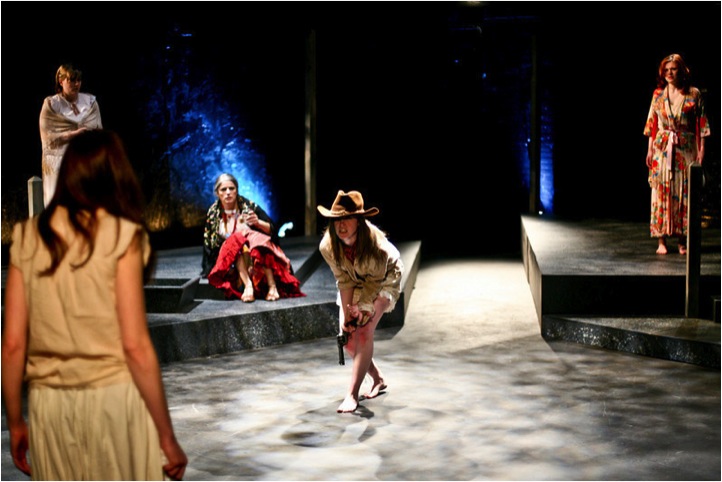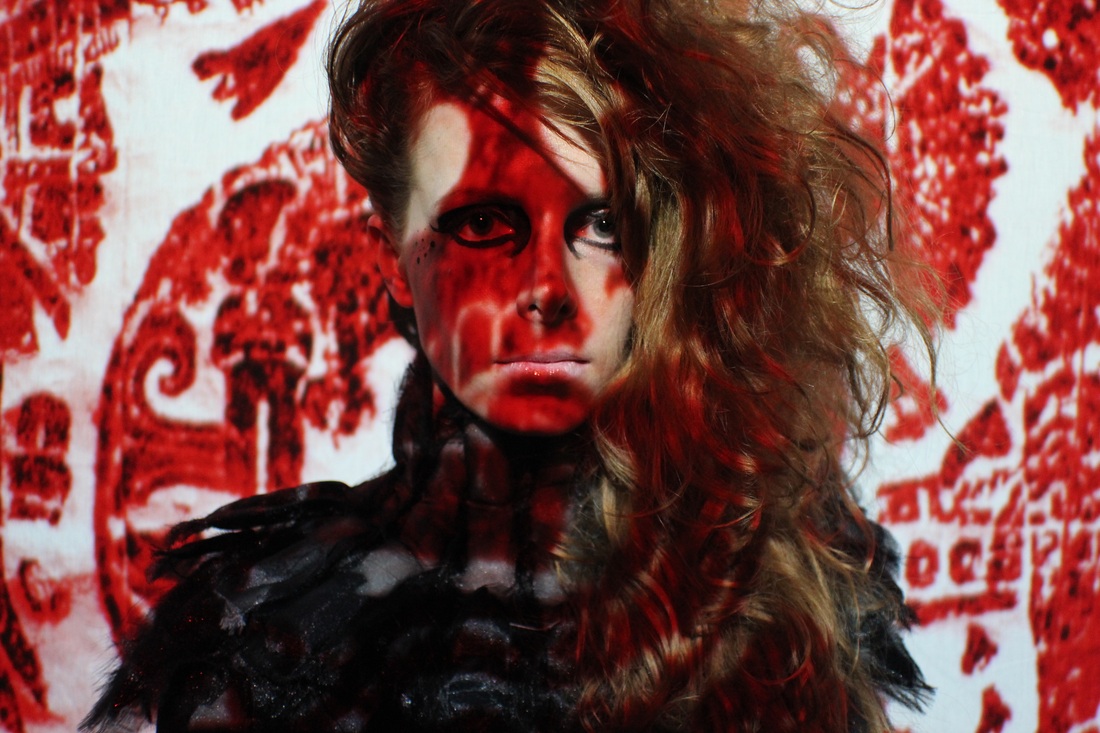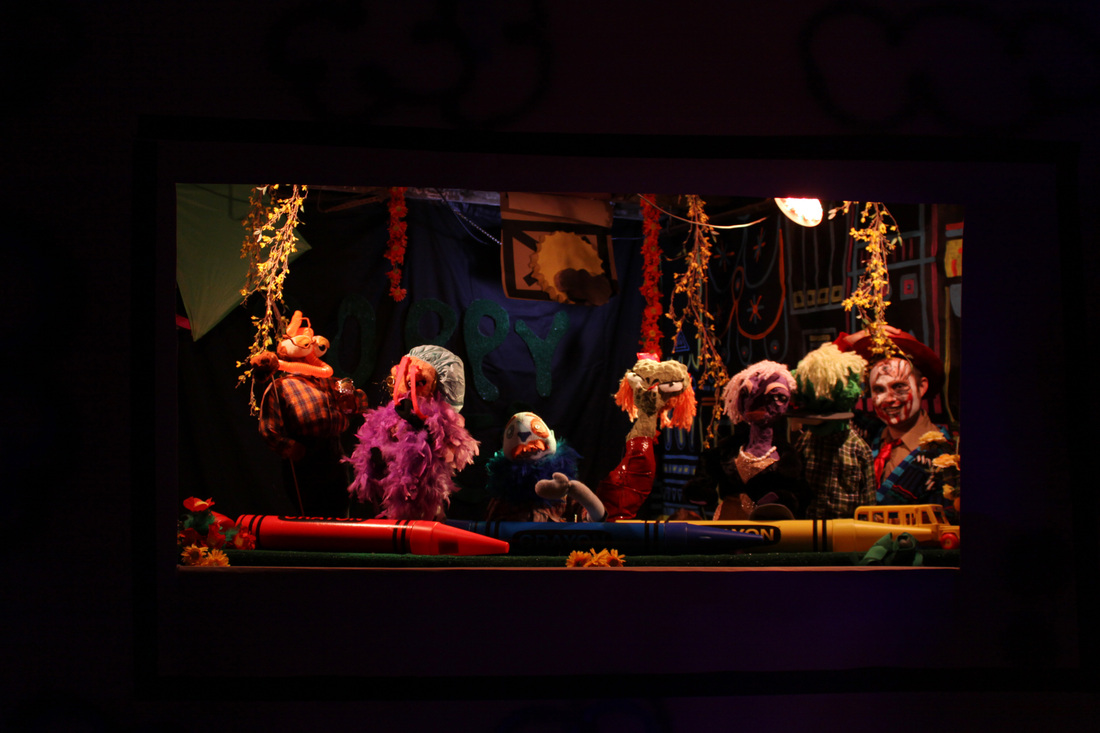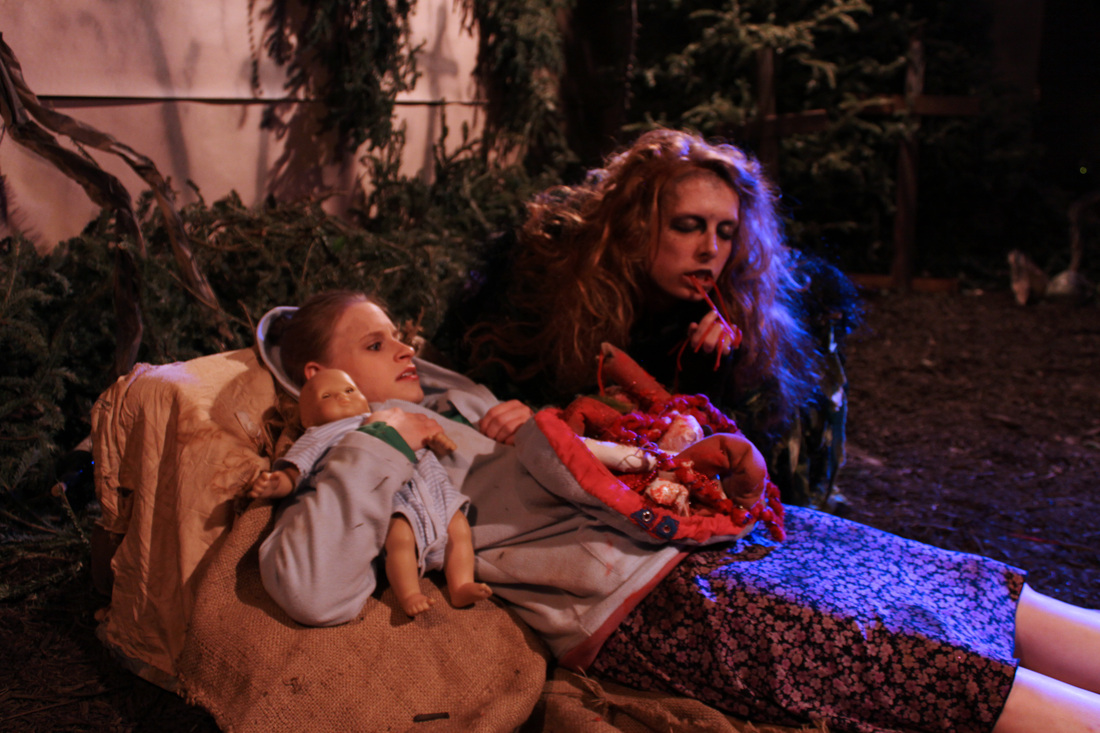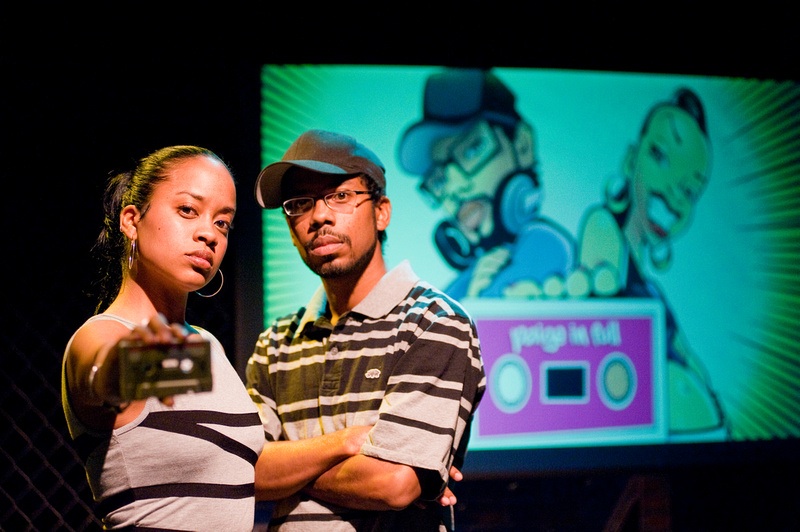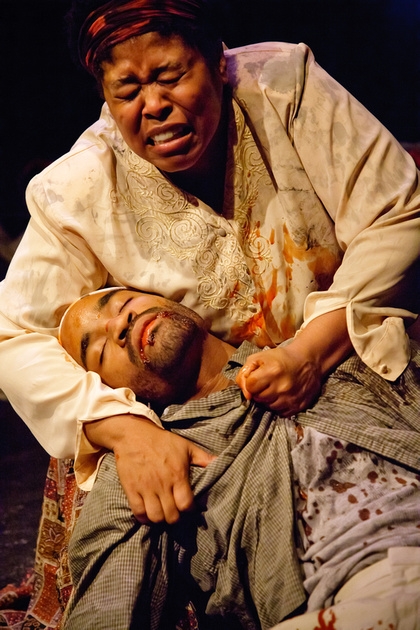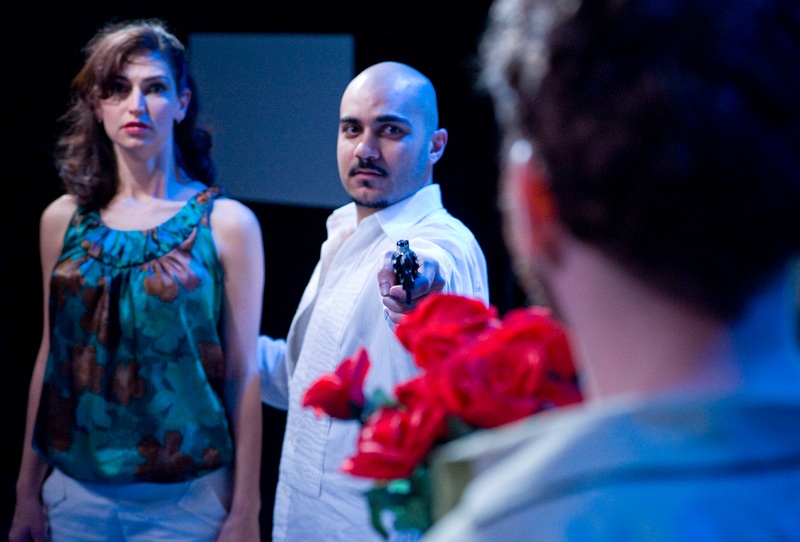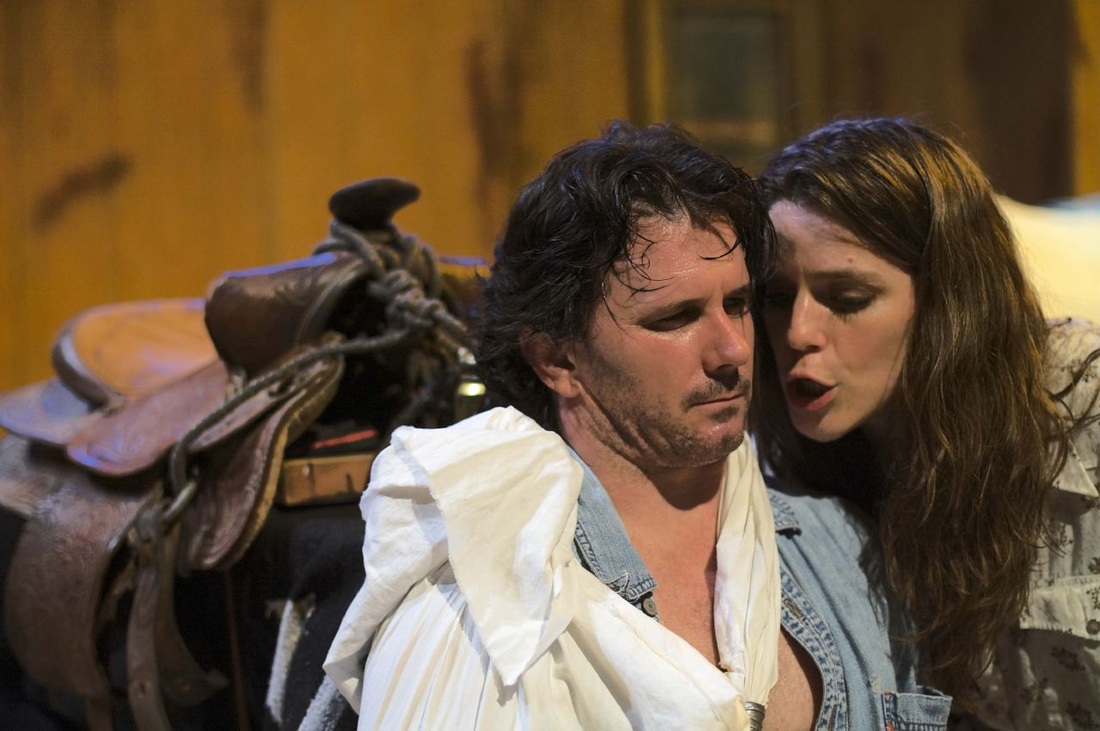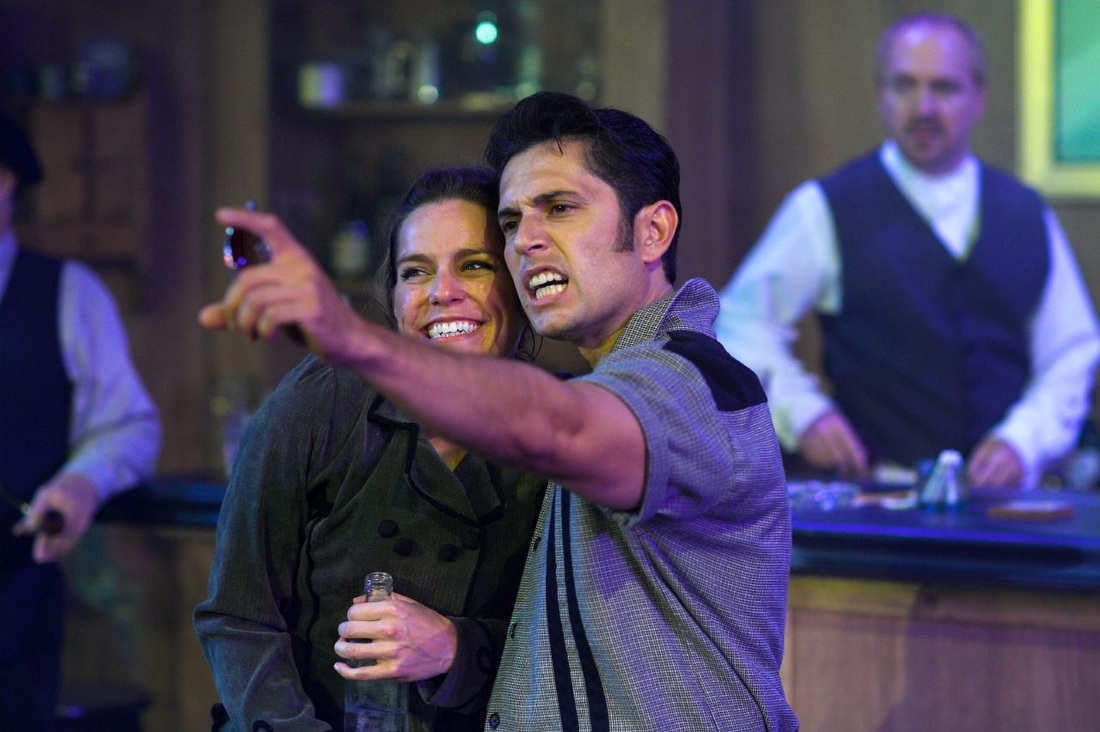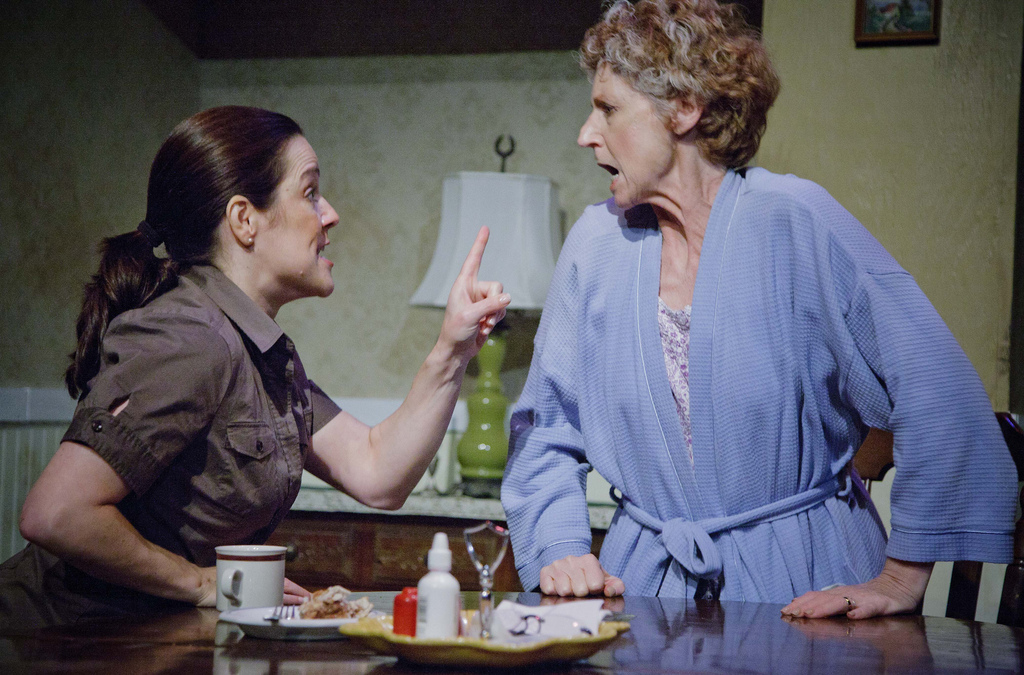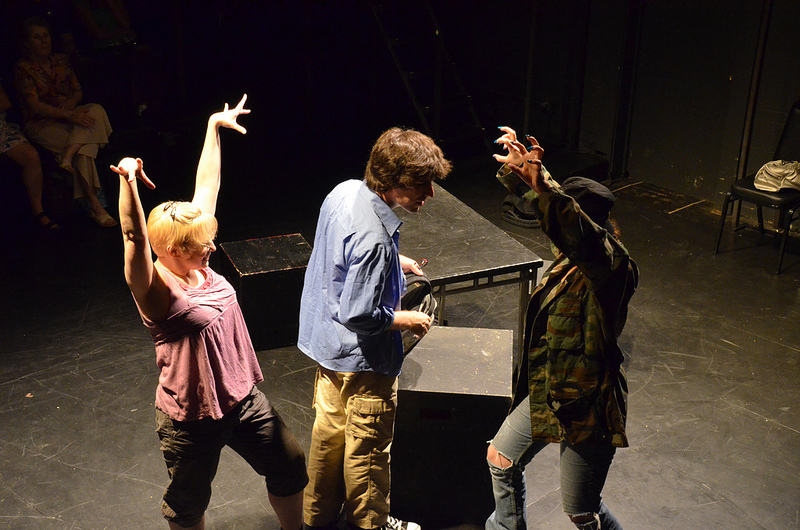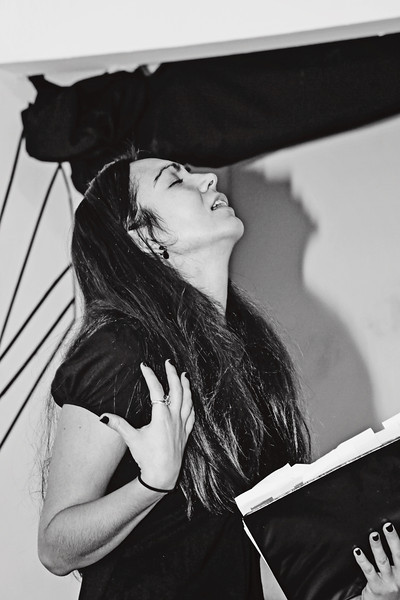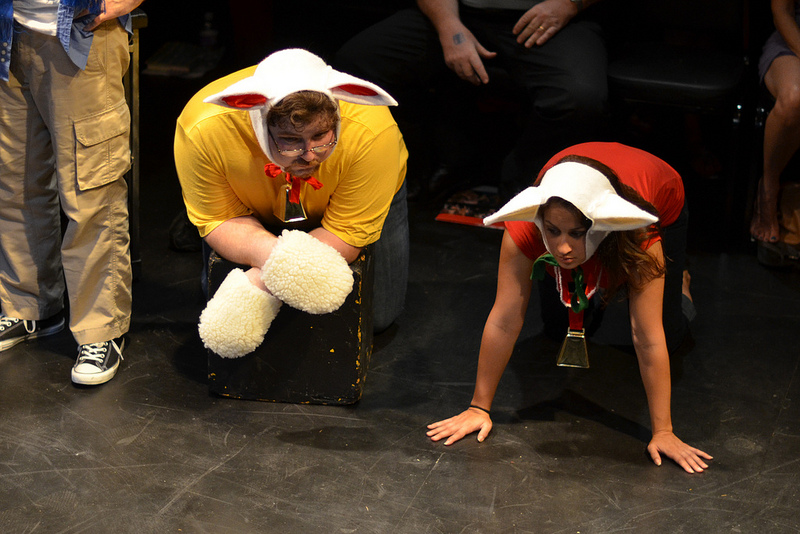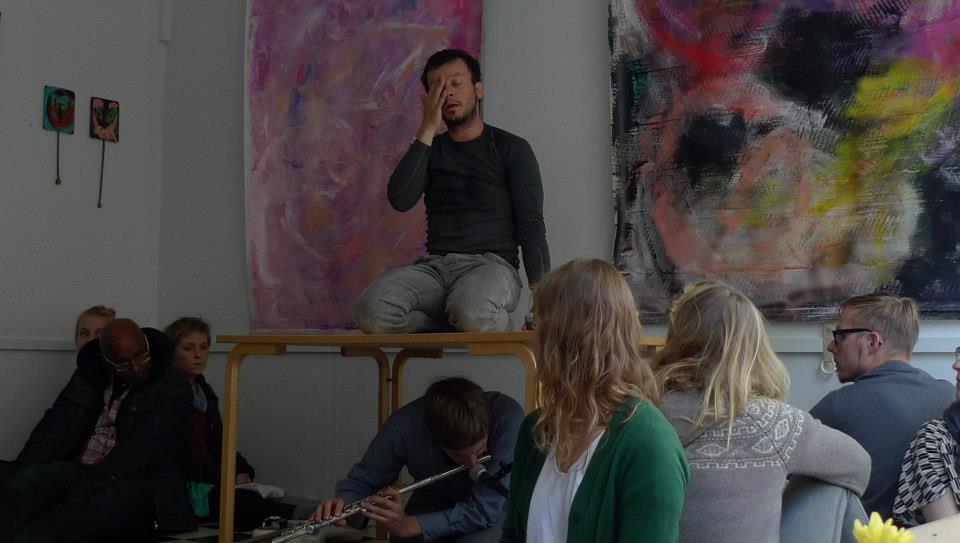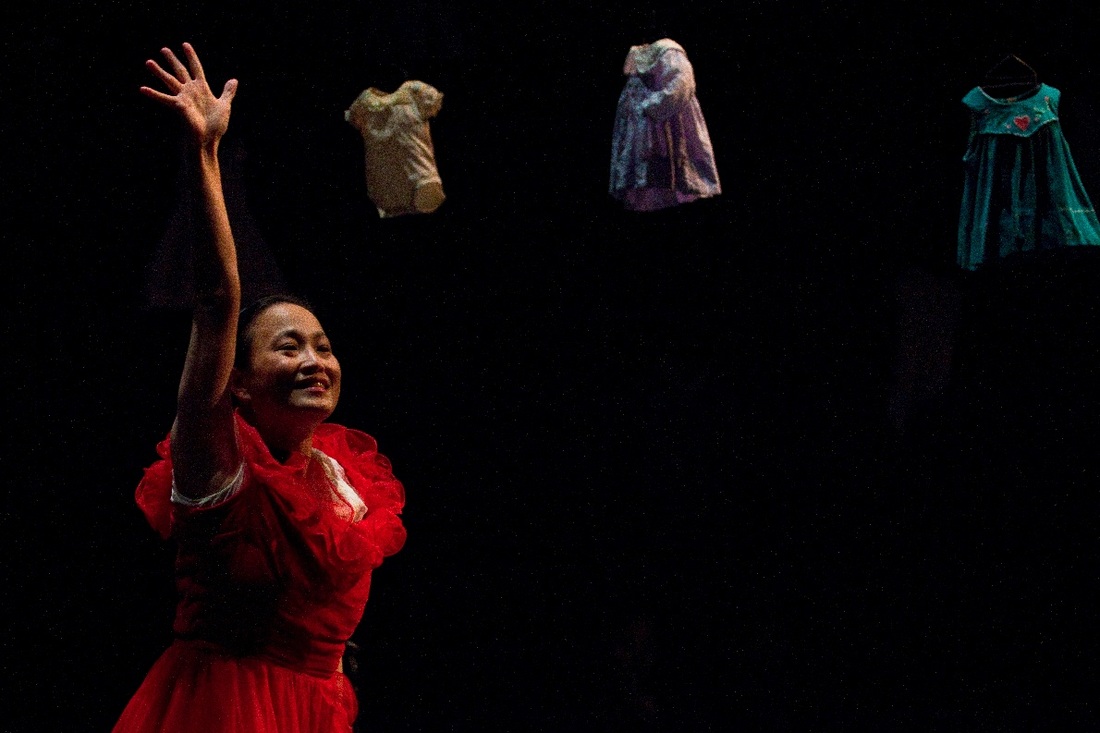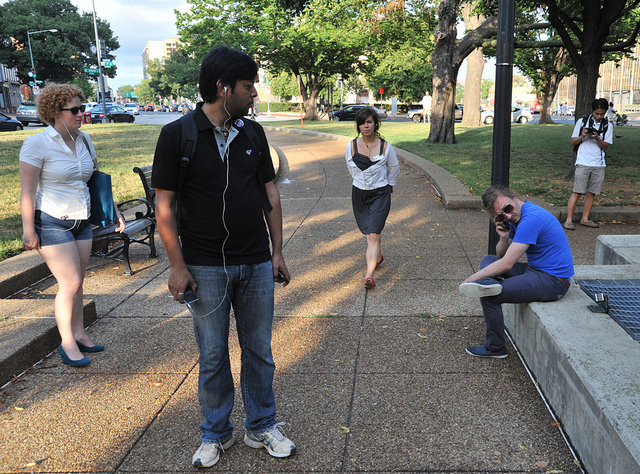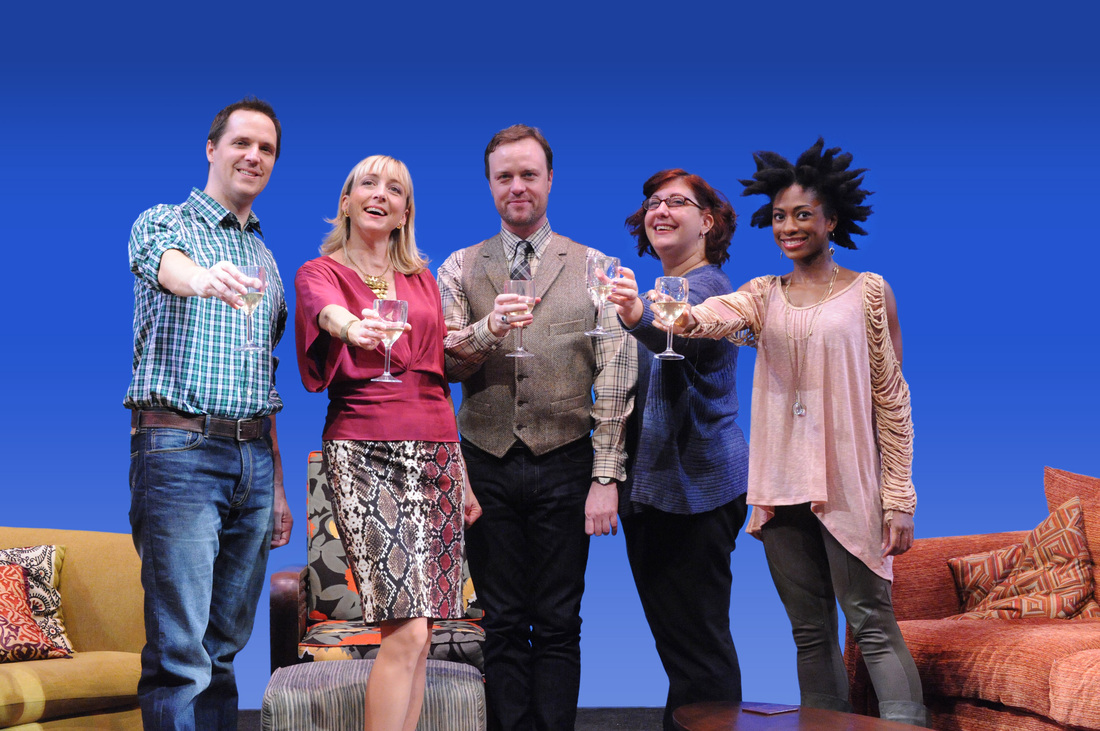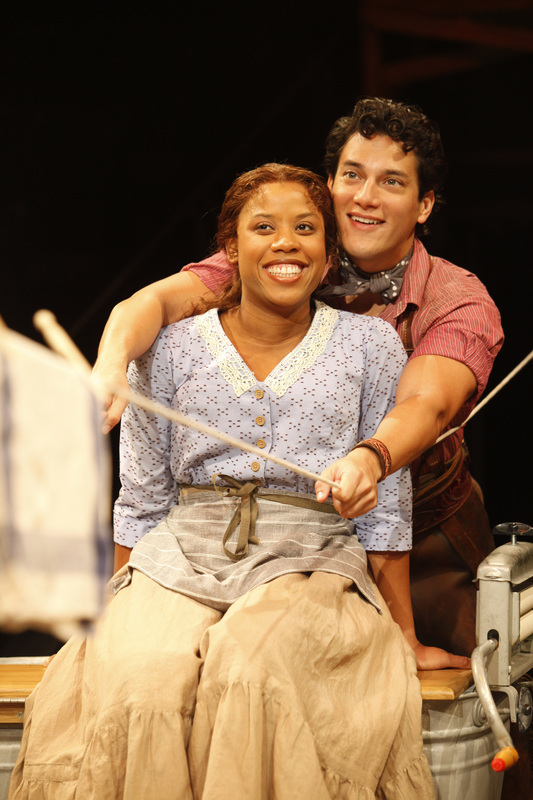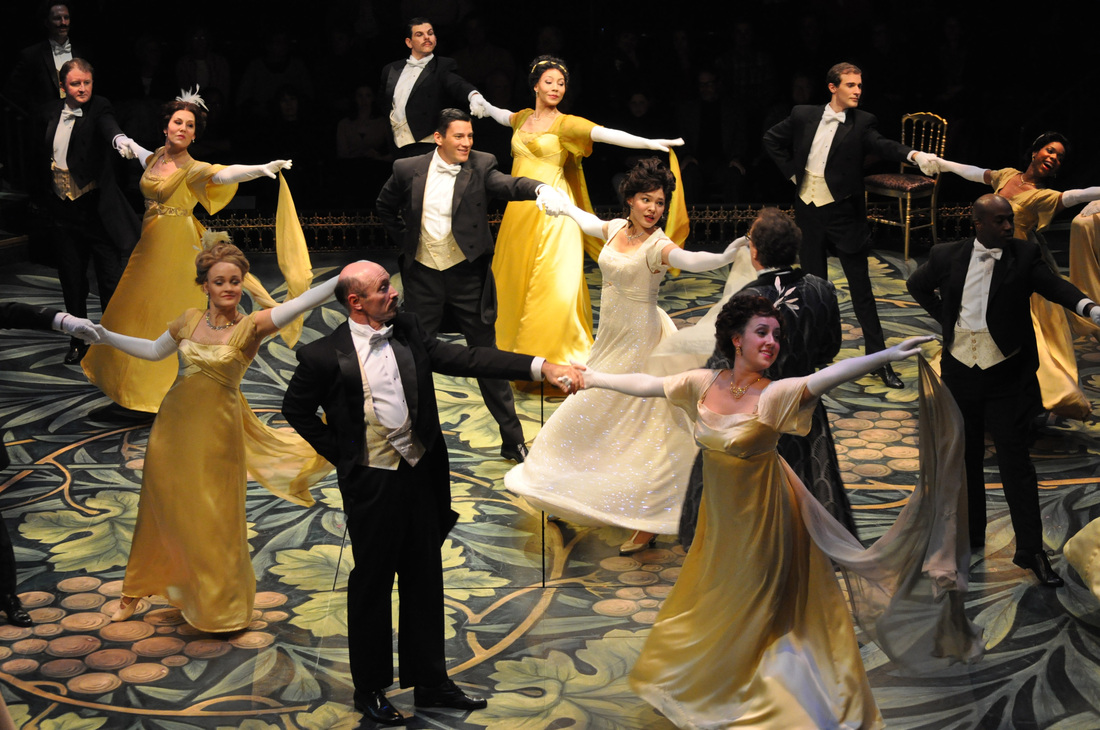|
JACQUELINE LAWTON: Why did you decide to get into theatre? Was there someone or a particular show that inspired you?
MARY RESING: The show that seduced me was called TERMINUS: THE BURNING OF ATLANTA. Directed by Dr. David Sauer, the play was produced in a wood frame shotgun chapel near the Avenue of the Oaks at Spring Hill College in Mobile, Alabama. TERMINUS envisioned the battle for Atlanta as a professional wrestling match between Generals Sherman and Hood and involved trapeezes, fire poles, palmetto bugs and a lot of sweaty actors. I had never seen anything like it. I didn’t understand it at all. I loved it. JL: How long have you served as Artistic Director at your company? What drew you to the position? What keeps you there? MR: I founded Active Cultures six years ago because I felt there was an urgent need to serve and preserve local culture. Like a locavore called to eat locally grown food, I have become a locaturg called to cr(eat)e locally grown art. JL: What is the most valuable lesson you learned during your tenure? Also, what skills and traits do you feel a successful artistic director should have to support the health and growth of an organization? MR: Never underestimate your audience. In this dumbed-down world, it is tempting to create fastfood theatre—theatre that goes down like fat-free frozen yoghurt with lots of colorful and sugary toppings. There is constant pressure to avoid anything that makes people think, that challenges them to be smarter than they think they are. One of the best audience comments I ever got was from a six year old who came to see Active Cultures’ production of PETRI DISH CIRCUS. PETR DISH was a play about the history of microbiology. We went a little overboard on the four and five syllable words. After the show, I somewhat nervously asked the boy how he liked play. He said, “I liked it!” A bit puzzled, I said, “But it has a lot of really big words in it.” He looked at me in surprize and said, “Oh, people are always saying words I don’t understand. I don’t mind. But this play was funny! And some of those words were cool.” JL: What excites you most about being an Artistic Director? What is your greatest challenge? MR: Collaboration. JL: If your work as an artistic director doesn’t pay the bills, what else do you do? Also, how do you balance your role leading an organization with your work as a director? Are you ever able to direct outside of your company? MR: All of this information is classifed. I can release it only to biographers who have had illicit relationships with married CIA directors. JL: Looking at your body of work as an artistic director and a director, how conscious are you and selecting plays by women or people of color when deciding your season? Also, when it comes to hiring administrators, designers and other directors do you take race and gender into consideration? MR: As a producer and an artist, I am interested in power dynamics both on and off stage. I’m fascinated by the intersections of race, gender, class, education, age and political agenda. At Active Cultures, we (Jacqueline Lawton, James Hesla and myself) are always juggling priorities. For example, what is better: a play by a woman or a play with a strong role for a woman? A play by a person of color with lots of roles for young white guys or a play by a young white guy with lots of roles for people of color? A play written by a woman or a play a woman wants to direct? A space that is accessible to artists in wheelchairs or a space where we can reach neighborhood kids and seniors? We argue, we struggle, we wrestle with our consciences, we make imperfect choices. In the end, our goal is to create locally specific work for a diverse, multigenerational audience. If we keep that goal in mind, we usually create work by a diverse group of artists from multiple generations. And as we all know, whatever you put on stage will be reflected in your audience. JL: DC audiences are ... MR: Unlike audiences anywhere else in the world. JL: DC actors and designers are ... MR: Driven, scrappy, visionary and politically savvy. JL: DC playwrights are … MR: Isolated. JL: DC critics are ... MR: Worried. With all of the current rapid changes in news media, today’s influential critic is tomorrow’s unemployed writer. JL: What advice do you have for up and coming theatre artists who have just moved to D.C.? MR: Come work with me. JL: What's next for you as a director and your company?? MR: On Feburary 22 & 23rd, Active Cultures will produce .govaculture as part of the Intersections Festival at the Atlas Theatre. .govaculture is an evening of 1 minute plays about working for the federal government. Tickets can be purchased at http://intersectionsdc.org Of course, since .govaculture is inspired by the federal government, we expect it to be over time and over budget.
0 Comments
JACQUELINE LAWTON: Why did you decide to get into theatre? Was there someone or a particular show that inspired you?
JESSICA BURGESS: I fell in love with the theatre attending productions in the San Francisco Bay Area, in particular at American Conservatory Theatre and Berkeley Rep. My parents were – and continue to be – subscribers to both companies, and often took my sisters and me to see productions. I remember seeing Mary Zimmerman’s production of Journey to the West when I was a teen and being blown away by the sheer theatricality and joy of that production. In college, I studied abroad at Royal Holloway, the so-called country campus of the University of London, and saw many productions while in the UK. In particular, I attended a slew of physical theatre adaptations: Theatre du Complicite's Street of Crocodiles, Arabian Nights at the Young Vic, Handspring Puppet Company’s Ubu and the Truth Commission, to name a few. All my life, I have adored writers who reinvent language and defy the laws of physics: Dahl, Rushdie, Marquez, Murakami, Flann O'Brien. These physical theatre productions three-dimensionalized the breathtaking otherworlds of the literature that I love. I started directing in order to stage wildly theatrical, language-driven plays. I wanted to ignite the imaginations of artists and audiences by inviting them into impossible three-dimensional worlds; I longed to conduct a symphony of language and re-tune the listeners' ears to the gravity-defying potential of ordinary language. The Inkwell springs from the same impulse: to support the work of playwrights whose imaginations are bigger than what theatre currently is or does. JL: How long have you served as Artistic Director at your company? What drew you to the position? What keeps you there? JB: The inspiration for The Inkwell struck when I followed your footsteps, Jackie, into interning with the fabulous Mary Resing in dramaturgy and literary management at Woolly Mammoth. (Quick aside about my dear friend and collaborator Mary, whom I went on to co-found Active Cultures, where she does a brilliant job as the Artistic Director: she is the only person who inspires me to write musicals – but more on that some other time). Sorting through the towering stacks of submissions under Mary’s watchful eye, I had a hunch that my duel passions for literature and gravity-defying theatricality could be of service to the playwriting community here in Washington and nationwide. In the summer of 2007, I found myself in a bind: the festival I had co-founded, The Hatchery, had just folded – and the DC Commission on the Arts and Humanities generously awarded me the Young Emerging Artist grant of $2,500 to produce a festival of new works. And so, with the unwavering support of the Commission, thoroughly convinced that the idea of a new play development organization had legs, I asked my dear friend and former roommate Eileen Daly Vitelli if I could throw a pizza party in her front yard to start a new theatre company. She agreed, and I showed up with pizza. To my surprise and delight, people came! I’d like to say that The Inkwell sprung fully formed from a pizza box, like Athena from Zeus’ head. In fact, the company’s development has been iterative. I am deeply indebted to The Inkwell’s founding company whose input and creativity in those early meetings shape who were are today. From that founding company, four of us stepped up to steer the ship: Lee Liebeskind, Lindsay Haynes Lowder, and Anne M. McCaw. With these three amazing, inspiring, and phenomenal people, The Inkwell began its first phase of growth. Today, our leadership team has seven amazing members, including Amber Jackson and Jenn Book Haselswerdt, and a fantastic board of directors, led by Manny Strauss. I am so proud of the work that we do. To date, The Inkwell’s reader corps of trained reviewers have read and evaluated more than 850 plays in progress. We have introduced DC’s playmakers and playgoers to more than 80 inventive plays that push the boundaries of theatre. And we have recruited more than 300 playmakers — including playwrights, actors, directors, dramaturgs, designers, and stage managers — to present plays in progress, discuss the state of new play development in our nation’s capital, and explore various aspects of the play development process through master classes. It’s been an amazing journey. I don’t know if your readers are aware, but I relocated to the San Francisco Bay Area this past September. Because we have run Inkwell from our living rooms and desks since our beginnings, hosting meetings via Google Hangout and Skype (even inviting playwrights into the rehearsal room via Skype), living in my native golden state does not prevent me from participating in the company. Hooray for modern technology! I am so grateful to my collaborators for supporting my decision to move to California, and I am especially grateful to continue to work with them. JL: What is the most valuable lesson you learned during your tenure? Also, what skills and traits do you feel a successful artistic director should have to support the health and growth of an organization? JB: We designed The Inkwell to be a learning organization. We’re constantly beta-testing ideas, adapting and refining our programs, and asking ourselves what we want to explore next. We see every showcase, every reading, every encounter with an artist or an audience member as an opportunity to learn and grow. Personally, from my work with Inkwell, I have learned a lifetime’s worth of lessons about the art and practice of leadership, nonprofit management, delegation, collaboration, compromise, my own limitations, and friendship – oh, on top of all of that, I have learned a great deal about new play development! An artistic director must have vision, a deep love of theatre, a lot of energy, and a natural buoyancy of spirit. But more importantly, a strong artistic director acknowledges where her talents are not, and recruits and relies on strong partners to support her in pursuing the company’s mission. JL: What excites you most about being an Artistic Director? What is your greatest challenge? JB: I can’t possibly narrow down what excites me to just one thing. So here are my top three:
For me, the greatest challenge of being an Artistic Director of a small theatre company is finding balance – between life and work, between administration and art, between racing ahead and moving slow and steady. JL: If your work as an artistic director doesn’t pay the bills, what else do you do? Also, how do you balance your role leading an organization with your work as a director? Are you ever able to direct outside of your company? JB: I produced the first two Inkubator Festivals from my desk at a law firm where I was a legal secretary. I left my day job in 2009 to freelance as a teaching artist and a director. I am honored to count Imagination Stage and Theatre Lab among the places that I have had the opportunity to teach. I absolutely cannot say enough good things about working with those two organizations as a teacher – teaching provided me some of my most rewarding artistic experiences. I loved working for Deb Gottesman, Buzz Mauro, David Markey, and Nikki Kaplan; I am so grateful to each one of them for more reasons than I can count. While I lived in DC, I freelanced as a director regularly, and am very grateful to have had the opportunity to direct for many small DC companies, from Adventure to Catalyst to Forum to Rorschach to Active Cultures. And now that I live in San Francisco, my work life is shifting again. It’s quite an adventure, and I am looking forward to what lies ahead! JL: Looking at your body of work as an artistic director and a director, how conscious are you and selecting plays by women or people of color when deciding your season? Also, when it comes to hiring administrators, designers and other directors do you take race and gender into consideration? JB: To date, half of the playwrights with whom we have collaborated are women, and 20% of our playwrights are artists of color. In hiring actors and directors, we recruit exclusively from our local talent pool. I am proud to say that we have demonstrated a commitment to reflecting the diversity of our city on our stages: for example, in 2011, of the 21 DC-based artists we hired for our programs, 14 (approximately 66%) are women, and 5 (approximately 25%) are artists of color. Mad props to Lee Liebeskind, our Producing Director, who does a fantastic job casting and hiring our talented artists. JL: DC audiences are ... JB: The smartest in America. JL: DC actors and designers are ... JB: Amazing collaborators. My extended family. JL: DC playwrights are .. JB: A rising tide. JL: DC critics are ... JB: Open to the conversation. Peter Marks and Nelson Pressley have always been incredibly generous; both have participated on panels at The Inkwell, sharing their thoughts about new play development. I think we’re very lucky to have smart and community-oriented critics reflecting on our work here. Of course, that doesn’t mean that my work as a director has always been well-reviewed. While I always find a less-than-favorable review disappointing, I don’t resent the feedback. Not everything one creates will resonate with every person in the audience – and if that person in the audience happens to be a critic, there’s nothing you can do but be grateful for the opportunity to tell this story to those who venture to see it. JL: What advice do you have for an up and coming theatre artists who have just moved to D.C.? JB: You have everything you need to pursue your dreams. Breathe deep. Begin. JL: What's next for you as a director and your company? JB: I moved to my homeland of the San Francisco Bay Area in September. I’m a part of the Just Theatre New Play Development Lab in Berkeley, which has been an awesome opportunity for me to get to know my native theatre community better! I’m still involved with The Inkwell and continue to serve as Artistic Director from afar. We have readings and showcases through the end of the year – our next showcase is February 9th. And I’m delighted to announce that we’re opening up our submissions on February 22nd! Check out www.inkwelltheatre.org for more information. I miss DC, but I’m overjoyed to be back with my family here on the beautiful West Coast after twelve amazing, rewarding and fabulous years in our nation’s capital. Onward and upward! JACQUELINE LAWTON: Why did you decide to get into theatre? Was there someone or a particular show that inspired you?
CARLY J BALES: I suppose this is the part where I talk about seeing Sound of Music when I was five and knowing that’s what I wanted to do with the rest of my life but, truth be told, it’s a little more subversive than that for me. I have a love/hate relationship with the theatre in which I am constantly searching for that electric and personal live experience which eludes me more than it appeases me. I was drawn to theatre through acting. As a peculiar and awkward youth, the transformative power of being other people in other worlds was phenomenal. By the middle of college, however, I was bored to death with most of the traditional plays I was seeing and focused primarily on film for the next few years. While I’ve come back to the theatre, I think that sentiment has stayed with me and molded my approach to it. At EMP, our programming is highly multi-disciplinary, immersive both physically and emotionally, and defiantly strange. JL: How long have you served as Artistic Director at your company? What drew you to the position? What keeps you there? CJB: I cofounded EMP with a small group of college friends in early 2010. We started with our first devised piece, WE’RE ALL GONNA DIE! and it has blossomed from there. I realized early on that I enjoy creating frameworks of worlds to play within. In this particular theatre piece, we transformed a warehouse space into a post-apocalyptic, consumerist wasteland incorporating performance, live music, dance, film, and visual art. There was a palpable excitement in the work from both our team and the audience. What started as a fun experiment quickly became a full-fledged operation with our own space in Baltimore three years later. What keeps me there? Well, I have yet to work with another group of folks so eager to play and be weird and produce quality new work at the same time. Besides, a life without EMP is no life at all, friends (JOIN US). JL: What is the most valuable lesson you learned during your tenure? Also, what traits do you feel a successful artistic director should have to support the health and growth of an organization? CJB: Communication. God, it’s so simple and yet so vast. Working with a lot of different artists for different events (we have a full schedule of programming in addition to theatre) and coordinating with our own tiny admin team has provided a rich training ground for how to effectively and smoothly communicate with each other online and elsewhere. I feel like a successful artistic director is personable and approachable, open to new ideas from anywhere, but who provides a strong, characteristic voice for the organization and its programming. JL: What excites you most about being an Artistic Director? What is your greatest challenge? CJB: I do what I want! Okay, that’s only partially true. But really, I love working with developing artists on new and exciting work. I love being able to provide people with a platform to hone their talents in a real, tangible sense. I also love the ability to have a crazy idea or read a bizarre, seldom-produced piece and actually do it. The greatest challenge (other than lack of producing space in DC) facing me currently is juggling my artistic obligations with growing our organization administratively and financially. Like many start-ups, we have a lot of passion but few resources and a very small team. EMP has had fortuitous success in our first years as a non-profit and arts collective. We started our multiuse art space up in Baltimore that has opened its doors to hundreds of industrious artists and over 50 events in the past year. We’ve also received great press and support from the community. Now the challenge lies in further developing our sustainability and our board in order to take ourselves to the next level of producing (and, you know, to pay our artists and ourselves living wages for work). I want to reward hard work and artistic risk-taking not discourage it. JL: If your work as an artistic director doesn’t pay the bills, what else do you do? Also, how do you balance your role leading an organization with your work as a director? Are you ever able to direct outside of your company? CJB: Because I’m clearly trite, I am a director who works at a restaurant to pay the bills. It is quite the juggling act between these two full-time jobs and doing projects outside of EMP. However, I think it’s important not to be completely insular artistically. I’ve recently started to allot more time to work on acting and writing projects outside of our programming. It’s always refreshing to meet new artists in new venues so I embrace it when I can. JL: Looking at your body of work as an artistic director and a director, how conscious are you of selecting plays by women or people of color when deciding your season? Also, when it comes to hiring administrators, designers and other directors do you take race and gender into consideration? CJB: Ah, this is pretty huge for me on all accounts, especially in terms of gender. In my position, I feel I have a responsibility to represent, bolster, and showcase dynamic voices from women in theatre. Women are the foundation of this industry but when you look at major or successful theatres, the “faces” of those theatres are overwhelmingly male and, more often than not, that is reflected in the programming that is presented to audiences. This fact weighs in heavily for me when selecting plays, directors, designers, and artists for projects. It’s simply imperative for us to lead, represent, and motivate others to lead. Anyone who says elsewise is full of it. JL: DC audiences are . . . CJB: Ready to be shaken up. JL: DC actors and designers are . . . CJB: Talented, hardworking, and professional. JL: DC playwrights are … CJB: A little bit of a mystery to me. I don’t know nearly enough of them yet. Hey DC playwrights! Holler at me! JL: DC critics are . . . CJB: What they are. (I’m clearly bad at this game.) JL: What advice do you have for an up and coming theatre artists who have just moved to D.C.? CJB: Don’t be afraid to be weird. Don’t be afraid to fail. Make a stand and be loud. DC needs more of you. Don’t wait around for someone to follow. Lead a new wave. JL: What's next for you as a director and your company? CJB: Many things! We have our One Minute Play Festival arriving next month in our Baltimore space featuring all local playwrights and artists in a whirlwind of over 50 world premieres. Our next full-length is the world premiere of Condo Condo Condoland by DC playwright Liz Maestri in May. This piece is especially exciting because it first came to fruition in our Cans n Drafts writing workshop last summer. It exemplifies many things I’m passionate about and I am ecstatic to see it come to life. After that, I’m trying to produce another piece for DC audiences this summer. In addition to theatre at EMP, we also produce visual arts exhibitions, multimedia art events, film screenings, and writing workshops. So keep up with us on Facebook, Twitter, or our email list. More importantly, get your ass out to these awesome shows! JACQUELINE LAWTON: Why did you decide to get into theatre? Was there someone or a particular show that inspired you?
DANIELLE A. DRAKES: My interest in theatre was as solely an actor growing up doing school plays and competing in speech arts competitions. JL: How long have you served as Artistic Director at your company? What drew you to the position? What keeps you there? DD: I founded the Hegira in 2008. I felt there was a great need to create an organization that would support and promote the work of women of color. JL: What is the most valuable lesson you learned during your tenure? Also, what skills and traits do you feel a successful artistic director should have to support the health and growth of an organization? DD: The most valuable lesson is learning how to ask for money to support something you believe in. Patience, communication and a love for encouraging other artists. JL: What excites you most about being an Artistic Director? What is your greatest challenge? DD: What excites me the most is seeing artists I have worked with moving on and meeting continued success. Greatest challenge thus far has been balancing creative personal and professional life with real life demands of house and family. My greatest challenge is giving 100% while balancing artistic career, family, professional affiliations. JL: If your work as an artistic director doesn’t pay the bills, what else do you do? Also, how do you balance your role leading an organization with your work as a director? Are you ever able to direct outside of your company? DD: I work fulltime time as the Education Outreach Coordinator at the Folger Shakespeare Library and continue to perform for Ford’s Theatre portraying Elizabeth Keckly for education programs and walking tours. Yes I have directed most recently for Howard University’s Department of theatre Arts. JL: Looking at your body of work as an artistic director and a director, how conscious are you and selecting plays by women or people of color when deciding your season? Also, when it comes to hiring administrators, designers and other directors do you take race and gender into consideration? DD: Very considerate. I tend to look at the world, look in the mirror, and look back at the world when deciding on what stories to tell. As far as collaborations, I am very interested in bringing a variety of personalities into the room with the goal of creating a space where the artists is free and safe to take risks. JL DC audiences are ... DD: Smarter than any of us think. JL: DC actors and designers are ... DD: Generous. JL: DC playwrights are … DD: Selfless. JL: DC critics are ... DD: Insightful. JL: What advice do you have for an up and coming theatre artists who have just moved to D.C.? DD: Commit to the practice of your craft (and not just the getting of the job), cultivate authenticity in your work, and take very good care of yourself. JL: What's next for you as a director and your company? DD: We are continuing project development and looking forward to collaborating with emerging DC artists. JACQUELINE LAWTON: Why did you decide to get into theatre? Was there someone or a particular show that inspired you?
SUSAN RHEA: I have loved the theater for as long as I can remember – when I was a kid, I staged plays in the living room (usually directed by and starring me, of course, and featuring my younger sister in all of the supporting roles). And I just kept at it. I’m not sure what started it all; I can’t remember one specific show, or person – though I was blessed with some terrific theater teachers over the years. I feel as though I have always been hyper-curious, almost, about other people (how they move, walk, , react, make decisions….). From way back, I was very interested in the notion of shedding my own skin and donning someone else’s – not that I was unhappy, or had an unhappy life, but that I had a ferocious and insatiable curiosity about being someone else. I guess that’s the best way I can describe what I would call my early interest in acting. My love for making theater in the larger sense (beyond as an actor) came later in life – I directed a bit in undergrad, but more as a matter of course. It wasn’t until I moved to New York and experienced theater in a different a way (in terms of a life in the theater, and what that can mean) that I noticed and nurtured a passion for working with a company, in a collaborative environment, and not just as an actor. I began to sense that, for me, real fulfillment meant being a part of a theater in a more integrated sense, as opposed to pursuing life as an actor independent of an artistic home. I wanted to be a part of an artistic family, and to have a say in the stories that were told and how they were told – I wanted the sense of community and hard work and aesthetic consensus, and the rich rewards of connecting with other people toward a common artistic goal. JL: How long have you served as Associate Artistic Director at your company? What drew you to the position? What keeps you there? SR: I first discovered Keegan as an actor – I had moved back to DC for a range of personal reasons and one of my first auditions locally was for Keegan’s season. I was in a production of TAMING OF THE SHREW in 2000, playing Kate opposite my future husband (though we didn’t know it then!) Mark as Petruchio. Other roles at Keegan followed, and it wasn’t long before I was involved with the company in a range of ways beyond just as an actor. I was intensely attracted to the company (insert Mark Rhea joke here) from the beginning, and for so many reasons – the artistic sensibility, the people, the plays they were producing, the quality of the work. Above all, I could see that Keegan was a true company, a family of artists, and I had always wanted that. So the fact that I had gotten involved with a company who had that collaborative, community feeling – in addition to being a company doing exactly the plays I love, and doing them with such clarity and honesty – it was a perfect fit for me as an artist. I could see that there was no pride in the company – the focus was on the product and not on individual priorities or ego-driven pursuits. I loved that. I began working on marketing materials, helping with the website, serving as the company production manager for a stretch. I’ve worn many hats at Keegan over the years, and I’ve enjoyed them all (well, most of them….). JL: What is the most valuable lesson you learned during your tenure? Also, what skills and traits do you feel a successful artistic director should have to support the health and growth of an organization? SR: I think that I’ve gotten much better at finding the balance between control and release. I have a very strong administrative brain, and I can be a bit of a control freak. I’ve learned how to let relationships and people breathe, and grow – and I’ve learned the profound joy of the discovery that happens when you don’t plan every moment. That was a hard-earned lesson for me, indeed. Running a theater company requires an extremely evolved sense of balance – of personalities, of priorities, all if it. I have a strong creative side, clearly, but I’m one of those artists who also really enjoys administrating and organizing. I like things to run smoothly; I like checklists. I really admire and respect discipline and kindness (as much as I respect talent, honestly), and I think these are qualities that are essential to running a theater company. It’s important to have both a real passion for listening and opening up, and then a real commitment to making decisions and sticking to them. Again: balance. JL: What excites you most about being Associate Artistic Director? What is your greatest challenge? SR: I think the most exciting thing, for me, is feeling an audience respond to our work and knowing all the details that went in to that work (from the person who handed us the script, to the photo shoot, to the first production meeting, to that opening night…). For me, the rich reward lies in being a part of each stage of it, in some way. It’s extremely rewarding and exciting to work as both actor and director with the same company of people. To see all sides of each other, and to feel that thrill when you know you have found something special. Keegan has grown outrageously, too – when I first met the company they were producing a few shows a year in a church basement. To try to put into words the sense of pride that we all feel for how far we have come would be nearly impossible. It is something that I have lived and breathed now for so many years – and the feeling of reward, after so much hard work and heartache and investment, is extremely hard to articulate. I can only say that excitement is an understatement, for me, in terms of how I feel about the future and the work we have done as a company until now. It has given my life as an artist true meaning to be a part of the journey and growth of this theater company. Greatest challenge – well, see the answer above. Finding and maintaining the balance. Mark and I have to remind ourselves to step away sometimes, take a break, think about something else … this can be very hard to do when you work together and share this much passion for the work. It’s hard to keep perspective sometimes, I think, when you run a smaller company – you feel like so much is riding on every single decision. I try to remind myself not to put so much pressure on, all the time. I think choosing the season is one of the hardest things we do – balance is everything there, too. We definitely have our preferences in terms of the kinds of stories and the kinds of structure we respond to and do well, but we have to balance everything against what our audiences want to see and will come to see, what our actors are inspired by and right for, what will fulfill us and keep us well rounded and challenged. I think we’ve done a really strong job but it is very difficult, every year. To see the growth, to hear the audience and listen to what they are saying about the work, that is how we know we’re making the right decisions. I think we are choosing well: finding those stories that people want to see, stories that Keegan will excel at telling, and stories that will be represented particularly powerfully in our intimate venue. But it’s a huge, aching challenge, every year. JL: If your work as an artistic director doesn’t pay the bills, what else do you do? Also, how do you balance your role leading an organization with your work as a director? Are you ever able to direct outside of your company? SR: I’m the website manager at the Alliance for Justice, which is located a few blocks away from the theater. I am extremely fortunate in that I really, really enjoy my work with AFJ too – the people, the mission of the organization, and the job itself. It taps into different skills and uses my brain in different ways, and they are very supportive of my theater life as well. I direct and act almost exclusively at Keegan – this is just the reality of my life right now. There’s rarely time for any outside work – not to mention I am lousy at putting myself out there independently of the company. It just never occurs to me. Having said that, when I do act outside the company, it is a real luxury to JUST act. Eventually, when and if things slow down, I am sure that I’ll get better at responding to and looking for opportunities. JL: Looking at your body of work as an artistic director and a director, how conscious are you and selecting plays by women or people of color when deciding your season? Also, when it comes to hiring administrators, designers and other directors do you take race and gender into consideration? SR: I tend to focus on the story, the script, and rarely the demographic of the writer – I am constantly reading plays, but if I don’t know the play or playwright, I don’t usually check to identify the ethnicity or gender. I just read the play. As far as hiring women designers, directors, and other staff, I think Keegan does a pretty great job of that, even if we do not have a policy. JL: DC audiences are … SR: Diverse, intelligent, plugged in. There’s something for everyone in this city as far as theater goes, and growing theater audiences in general is going to be a challenge as the theater scene continues to thrive and more companies are born. It’s a great challenge to have, but a challenge that will have to be met. There are those audience members who are never going anywhere other than the Kennedy Center – and that’s great, but they aren’t our target audience. We’re doing something different, with a different perspective and obviously on a different scale. We are looking for people who want the stories told as closely (and hopefully as clearly) as we’re going to tell them. In my opinion, our audiences are just lively, sharp people. JL: DC actors, designers, playwright are … SR: Fierce and resourceful, inspired, accessible. I will run out of adjectives here. It’s a great theater town, period. JL: DC critics are ... SR: There are some terrific, thoughtful theater critics in this town, and there are some less terrific, less thoughtful ones. There are critics who see past their own preferences and affections to recognize and discuss the work, and there are some who just can’t. There are some elitists and some non-elitists. Just like any other city, I would imagine. I’d love to see even more robust theater coverage in this city, more celebration of what the theater scene has to offer. I would love to see all of the local critics and media outlets recognize – really observe, respect, and acknowledge -- the full range of companies and not just the work of a few. JL: What advice do you have for up-and-coming theatre artists who have just moved to D.C.? SR: This community is thriving, filled to the brim with committed and inspired artists – take your time and get to know what’s out there. There quite probably is a theater company to suit your artistic disposition and tastes – keep looking until you find the people and the places where you really want to work. Don’t be afraid to ask questions and reach out – I have found it to be a very warm theater town. Also, it’s not a huge community, and by that I mean: WORD GETS AROUND. Work hard and be decent to others. JL: What's next for you as a director and your company? SR: Keegan is in the early stages of a major fundraising campaign to renovate our home at Church Street. There are some pretty significant developments in store, and things are about to get even busier – and more exhilarating – for Keegan. I just directed ALL MY SONS and my next directing for Keegan is THE FULL MONTY, with Mark – we just finished casting a bunch of totally kick-ass people. It’s going to be a blast – it’s always a treat for the company when Keegan lightens things up and has some fun! And of course, we’re in the planning stages for 2013-14 … finding that balance…. JACQUELINE LAWTON: Why did you decide to get into theatre? Was there someone or a particular show that inspired you?
KATHLEEN ALVANIA: I remember seeing Man of La Mancha as a tween and being amazed by this power the actors had of making hundreds of people feel all at once. I vaguely dreamed of becoming a performer, but didn't do anything about it for almost 10 years. The show that actually inspired me to take my first acting class was Mamma Mia! (oops, there goes my street cred). Everyone on stage was just having so much FUN! I couldn't stand missing out on that any longer. JL: How long have you served as Artistic Director at your company? What drew you to the position? What keeps you there? KA: I founded the Disreps almost a year ago. It wasn't really my ambition to become an Artistic Director. I had an idea that grew from “Let's do this play!” to “Let's do more plays and help ladies!” to “Let's do all the art and help all the people!” I'm still here because we haven't helped all the people yet. JL: What is the most valuable lesson you learned during your tenure? Also, what skills and traits do you feel a successful artistic director should have to support the health and growth of an organization? KA: My most mind-blowing revelation so far has been that “Could you do this differently?” does not equal “You should already know how to do this differently.” A successful AD needs grit, flexibility, grand dreams and a thick skin. Stress management skills don't hurt. JL: What excites you most about being an Artistic Director? What is your greatest challenge? KA: It excites me to meet people who are excited about our work; our mission statement is like a magnet for fabulous, compassionate, positive people. Challenge: I'm the slowest writer on the planet, so responding to email just kills me. Why are there so many?! JL: If your work as an artistic director doesn’t pay the bills, what else do you do? Also, how do you balance your role leading an organization with your work as a director? Are you ever able to direct outside of your company? KA: I walk dogs and petsit, and occasionally teach voice lessons. This year wasn't so much about balance as it was about getting the company off the ground, so I wasn't involved in many other projects. Check back with me next year! JL: Looking at your body of work as an artistic director and a director, how conscious are you and selecting plays by women or people of color when deciding your season? Also, when it comes to hiring administrators, designers and other directors do you take race and gender into consideration? KA: Our mission is all about providing a forum for the underrepresented, which pretty much automatically puts us in a position to receive interest from and provide opportunities for minority theatre-makers. For instance, we didnt take gender into consideration when choosing pieces for SLUT (our recent staged reading festival addressing the War on Women), but 85% of the plays we finally selected were written by women. JL: DC audiences are … KA: Eager and supportive. JL: DC actors and designers are … KA: My favorites! Also, sleep-deprived. JL: DC playwrights are ... KA: Brilliant and welcoming. JL: DC critics are … KA: Helpful to varying degrees. JL: What advice do you have for an up and coming theatre artists who have just moved to D.C.? KA: Just jump in because we really want to meet you! Join Actor's Center right now. Take classes: I'm a Theatre Lab alum and recommend them to everyone. Finally, we small theatre companies always need help, so volunteering is a great way to get your foot in the door and maybe earn some brownie points. JL: What's next for you as a director and your company? KA: Our next performance is black&blue, a staged reading festival comprised of short plays inspired by the many faces of domestic violence. Each performance will be followed by an Action Hour reception with representatives from local organizations involved with DV prevention and victim assistance. We haven't officially announced the dates yet, but we know it will take place mid-late spring. Follow us on Facebook and Twitter for updates! JACQUELINE LAWTON: Why did you decide to get into theatre? Was there someone or a particular show that inspired you?
CARMEN WONG: I was raised by a grandmother who lived for movie musicals (she saw “The Sound of Music” seven times when it came out in the theatres, “My Fair Lady”, “Mary Poppins” and “West Side Story” were marginal favorites). She would sing snippets of these classics to me as a child, a gateway drug to theatre I suppose, as I was soon performing and presiding in school drama clubs, saving pocket money to see actual musicals when they made their way to our tiny island state of Singapore, which also exposed me to street storytellers, Chinese opera, Javanese shadow puppets. My aesthetics and enjoyment of theatre has since expanded and morphed, in large part due to my involvement almost a decade ago with Dorky Park, a quirky dance theatre company based in Berlin headed by choreographer Constanza Macras. For the first time I saw how differently a performance could be shaped, with narrative, dance, video and spoken text meaningfully woven, fluidly hybrid, and unapologetically so. JL: How long have you served as Artistic Director at your company? What drew you to the position? What keeps you there? CW: I suppose I created this position for myself without knowing all it entailed. Today, 8 years since our first project, we are discovering not only what kind of work we’d like to keep creating, but also what kind of innovative, sustainable, responsible institutional entity we could be. The mission - to create our blend of avant-pop immersive experiences - keeps me going and keeps us creating work that challenge definitions: of relationships and ethics between audiences and performers; of boundaries and hybridity in artistic concept. I love that we keep finding new, unorthodox ways to ask those questions, investigate new answers. In many ways we've only just begun, as we grope our way about, finding new organizational models to adopt, molding our audiences who are getting to know us, or accepting the help of supporters who can help us get to where we need to be. There is so much to learn and grow into, from individual artistry, to collaborative relationships, project orchestrations, and now organizational goals, and I hope we never stop learning and adapting to find the right fit at any given moment. JL: What is the most valuable lesson you learned during your tenure? Also, what skills and traits do you feel a successful artistic director should have to support the health and growth of an organization? CW: Many more important lessons, I sense, are still to come, particularly on how to take care of the health and growth of an organization, but here are some applicable nuggets:
JL: What excites you most about being an Artistic Director? What is your greatest challenge? CW: The magic of a collaboration going well (hitting all the sweet spots of communication, vision, timing, connectivity) is thrilling, and for us extends to the audience too. I savor the moments of just watching, not even taking notes, but just seeing/feeling the dynamics in the entire space where a banished? project unfolds. I find it a luxury being able to observe and adjust what I am doing. Conserving energy is a huge challenge for me personally, and I'm learning to lean and lead, relying on the strengths of folks around me, and know I don't have to do it all. I'm also learning to let things come together more organically, with patience (not at all a strong suit) and trust in intuition. JL: If your work as an artistic director doesn’t pay the bills, what else do you do? Also, how do you balance your role leading an organization with your work as a director? Are you ever able to direct outside of your company? CW: I have a part-time job with a mediation non-profit and find the odd gig with farmers’ markets, where I'd worked prior (as an EBT coordinator, interfacing with food stamp users at market) for the last 3 seasons. These jobs actually keep me grounded, nourished, self-aware and balanced. I'm continuing to learn to separate the different kinds of work in banished?, and learn how to nurture each part (the administration, the leadership, the artistry and more...) and identify what I need in order to do that in a way that is more fulfilling. As for directing outside: yes! I'm thrilled to be directing/crafting a piece with Wit's End Puppets, whose 'The Amazing & Marvelous Cabinets of Kismet' the premiering in April 2013 at the Mead Theatre Lab in Flashpoint DC. It has been lovely working without my producer hat but sharing my experience and insights with two super talented women Cecilia Cackley and Genna Davidson. JL: Looking at your body of work as an artistic director and a director, how conscious are you and selecting plays by women or people of color when deciding your season? Also, when it comes to hiring administrators, designers and other directors do you take race and gender into consideration? CW: I remember being very clear on how I wanted to cast an all-female and multi-racial version of "bobrauschenbergamerica" with male characters only appearing in the 2-dimensional world of video. The body of work and core team has been somewhat women-centric, but I am ever cognizant of diversity within banished? I feel lucky that we have had a good mix of colors, ages and voices since the start, from actors, interns and advisors and I want to be able to maintain this going forward. JL: DC audiences are ... CW: The best challenge and resource I have. JL: DC actors and designers are .. CW: Just dandy and fine (waggle brows). JL: DC playwrights are ... CW: Such hard workers. JL: DC critics are ... CW: Audience members too, but with different ethics and responsibilities. JL: What advice do you have for up and coming theatre artists who have just moved to D.C.? CW: Do your thing, do it well, be open-eyed and -hearted and find opportunities to step outside your comfort zone. See as much as this city has to offer and of course, leave your imprint. JL: What's next for you as a director and your company? CW: Change and growth! More projects and events that bring us to amazing people, lessons, unexpected twists that keep us on our toes. I'm currently working on a completely different version of Tactile Dinner and hope it finds some interest and traction. JACQUELINE LAWTON: Why did you decide to get into theatre? Was there someone or a particular show that inspired you?
MOLLY SMITH: I don’t remember when my love affair with theater began, but I do remember my first childhood theater experience was a musical – watching a touring production of Camelot in my hometown of Yakima, Washington, starring Robert Goulet. I can remember everything – the red seat I sat in, the section of the balcony where my seat was, the light emanating from the stage, my own body leaning in. I was hooked. There were other moments. My mother had a stereo in her bedroom, and I played her LP recording of Oliver so often the record had deep grooves. I belted out the song Who Will Buy? loudly, hoping the whole neighborhood would marvel at the strength of my voice. I sat in the front row of a high school production of Bye Bye Birdie and swooned. Later I was in Teen Theater---I have been fascinated with theater since I was a child building stage settings and taking photographs... JL: How long have you served as Artistic Director at your company? What drew you to the position? What keeps you there? MS: This is my 14th season at Arena Stage. The theater and Zelda Fichandler, its founder, have had a huge impact on me as a student in Washington, DC. Though it was 10 times the size of Perseverance Theater, the theater company I started in Juneau, Alaska, I couldn’t pass up the opportunity to help continue its legacy. I love to be a part of a place that not only generates new work but also celebrates the American Giants with a contemporary resonance. There is no better community in which to do this kind of work because Washington DC has the smartest audience in the country. JL: What is the most valuable lesson you learned during your tenure? Also, what skills and traits do you feel a successful artistic director should have to support the health and growth of an organization? MS: One lesson that I’ve learned is the value of ‘friendly rivalry.’ I’ve come to appreciate the drive that a fellow director can provoke. I seek out those kinds of relationships. I want to work with people that inspire me with their intensity and push me past my own internal obstacles whether it is talking to actors about difficult issues, pushing designers to get what the production needs, or fighting to focus the company on the production. A ‘friendly rivalry’ simply makes you want your work to be better. Visual artists like Matisse and Picasso or Bonnard and Vuillard bruised and invigorated each other’s work for a lifetime. Sometimes I think in the theatre we are afraid of talking about these ‘friendly rivalries’ and yet I believe they are an important dynamic in making the work better. I believe the most essential skill for an artistic director is to build the ideal Artistic Home. I am not speaking of a brick and mortar home, but a home with a big heart and a big hearth supporting everyone who lives under its roof— artists, staff, audiences and trustees. It may be messy and full of the craziness and fire of everyday life but I like it. This home may look like a gorgeous gilded opera house, a black box or a church basement…it doesn’t matter. The key is to ensure that there is support and a nurturing atmosphere for the individuals who live within its walls— whatever those walls look like. JL: What excites you most about being an Artistic Director? What is your greatest challenge? MS: As an artistic director I am thrilled to be able to assemble and share such a diverse collection of stories with the remarkable DC audiences. I love digging into the range of American voices we’re able to produce and present here at Arena. I am moved by our American vitality. I have come a long way since my theater beginnings in the 70’s, but I still find navigating my way in the world of theater challenging. About the time I settle into a predictable period, life shifts and new challenges appear. I think of myself as an emotional visualist. As a director, I set up the circumstances in the rehearsal space for the actors to experiment, improvise and dig deep into the visual and emotional psychology of the story. I believe in the power of process in the rehearsal hall. Even in a musical we spend the first week around the table dissecting the story and the characters, asking tons of questions, doing character improvisations, digging into research. I’m sad to say that most productions no longer use process—it’s immediately only about staging, music and choreography. These elements of process—and they will be radically different for each person’s production—open up the artist to their imagination in the rehearsal hall. More and more these elements of process are being lost— are not being taught— are not being explored— because of a focus on bottom line thinking. But the use of the imagination is what I think theater offers to our community. Without it, we only focus on craft and not the art form. Yes, we are a craft and always will be—but we are also an art form. I think the real bottom line in the theater needs to be about this openness to creativity and the imagination whether it’s about a new play or revisiting a classic piece of literature. JL: If your work as an artistic director doesn’t pay the bills, what else do you do? Also, how do you balance your role leading an organization with your work as a director? Are you ever able to direct outside of your company? MS: The essential component in balancing my work as an artistic director and director is being a part of a dynamic team that supports me and supports the work. When I am directing for Arena Stage and when I’m directing elsewhere they are here. Edgar Dobie, Executive Director for Arena, and I have a strong and close relationship. He is a tremendously skilled administrator and producer and we are always in constant communication. Edgar and David Snider, our Director of Artistic Programming along with the Senior Staff are all extraordinary at what they do. JL: Looking at your body of work as an artistic director and a director, how conscious are you and selecting plays by women or people of color when deciding your season? Also, when it comes to hiring administrators, designers and other directors do you take race and gender into consideration? MS: I am always conscious about the voices that are included in each season we design at Arena. We are a theater that produces, presents and develops American theater. We tell the story of Americans. Women and people of color are a huge part of this story. So, yes, it is important to me that each season includes those stories. In this season of 10 shows there are 5 productions created by women and 5 directed by women and 3 productions directed by people of color. There are 5 productions with people of color in leading roles and all of the productions include leading roles for women. It is the same for administrators, designers and directors. I am a champion for diversity throughout the organization and I always hire the person that I believe is the best for the job. JL: DC audiences are ... MS: The most engaged I’ve ever seen. JL: DC actors and designers are ... MS: A growing, burgeoning pool that continues to propel this artistic community. JL: DC playwrights are ... MS: Courageous, constantly challenging themselves and this community. JL: DC critics are ... MS: Some of the smartest in the country. JL: What advice do you have for an up and coming theatre artists who have just moved to D.C.? MS: Protect the fire in your belly. This fire in the belly is about passion— and I want to tell you that you need to protect it, fuel it, feed it with ideas and goals—because many would like to take it away. There are too many people who throw water on an idea before it’s had a chance to grow, the ones who would rather give destructive rather than constructive criticism because then they can try to steal a piece of someone else’s fire. It’s up to you to protect the fire from all comers, to hold it in your belly—because the dreams you have today is what will get you up out of bed in the morning -- it’s what will take you through the difficult days as you pursue your lifelong goals. JL: What's next for you as a director and your company? MS: I have been invited to direct The Velocity of Autumn by Eric Coble on Broadway. Rehearsals are planned from the end of February through opening April 15th. I say ‘planned’ because our wonderful Producer Larry Kaye is raising money and focusing on looking for the right theater to produce the play in. Both need to be in place before the project goes forward—the road to Broadway is a complicated one… Actors are Estelle Parsons and Stephen Spinella and designers are Eugene Lee (set), Howell Binkley (lighting), Darron West (sound), and Linda Cho (costumes). The Velocity of Autumn is a powerful and funny play with a superb cast and design team. There are only a small handful of women directors on Broadway each year—I’d be thrilled to be one of them. 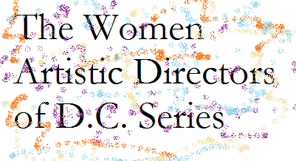 Welcome to the Women Artistic Directors of D.C. Series! Over the next several days, you'll be introduced to a remarkable range of women artistic and associate artistic directors, who are as diverse and varied in their artistic visions as they are in their approaches to leadership. Among these women are leaders at the beginning their careers, boldly defining their artistic visions; mid-career leaders who are challenging and changing the discourse of theatre in the D.C. area and beyond; established leaders who've achieved national recognition and critical acclaim; and theatre legacies who revolutionized the field and have made lasting impressions on the community. Each and everyday with every choice they make, these women are making an indelible impact on the landscape of American Theatre. If you feel that the work you're doing speaks to any of their artistic visions and creative passions, then by all means, get in touch with them. Make a theatre date and change the world. With so many brave, talented, intelligent, savvy, and hardworking women artists and leaders in one city, there's no reason gender parity in the theatre can't be achieved in our lifetimes! Now, as with the Women Playwrights of D.C. Series and Women Directors of D.C. Series, it is my hope that these interviews will serve to inspire, inform, and motivate others who are making their way as artistic leaders in the Nation's Capital, and perhaps beyond. Stay tuned, everyone, and please enjoy! 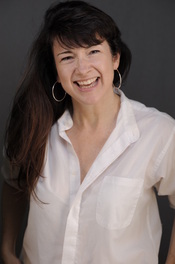 KATHLEEN AKERLEY Kathleen Akerley is the artistic director of Longacre Lea, a small, professional theater company founded in 1998 and devoted to creating physical productions of cerebral works with an emphasis on absurdism and magical realism. As a freelance director she has also worked with Baltimore Shakespeare Festival, Solas Nua, Rorschach Theatre, Theater Alliance, Forum Theatre, WSC Avant Bard and Studio Second Stage; as a playwright she has worked with Sideshow Theatre (Chicago), eXtreme eXchange, Source Festival, The Hope Operas, had several plays commissioned by Round House Theatre's Heyday Players, adapted Kurt Vonnegut's Cat's Cradle for the stage in 2010 and had readings of her plays Only Angels at Theatre J's 5x5 series and The Hungry Dry at Boston Center for the Arts; as an actor she has worked with Catalyst Theatre, Theater Alliance, WSC Avant Bard, Washington Stage Guild and Olney Theatre. She is a recipient of the Mary Goldwater Theater Lobby Award for acting and directing, and a member of the playwriting collective Lizard Claw. 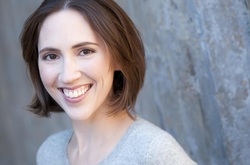 KATHLEEN ALVANIA Kathleen Alvania is the founder and Artistic Director of The Disreputables, a theatre company aimed at giving voice to the unheard, the misjudged, and the misrepresented. She is a graduate of the Theatre Lab Honors Conservatory and holds a B.M. in Vocal Performance from Kent State University. She has worked with Repertory Opera Theatre of Washington, Active Cultures, Greenbelt Arts Center, McLean Community Players, and The Inkwell. Since forming the Disreps, she has produced David Mamet's Boston Marriage and Lucy Alibar's Gorgeous Raptors, both at Capital Fringe, and the SLUT Staged Reading Festival. She has also directed Theresa Rebeck's What We're Up Against as part of DC SWAN Day. 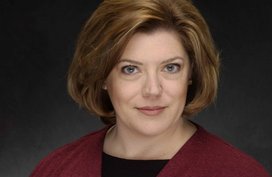 CATHERINE ASELFORD Catherine Aselford began her professional career performing in Bus Stop at the Source in 1982, graduating with a BFA from Catholic University two years later. She and four other artists founded The Georgetown Theatre Company (now Guillotine Theatre), in order to present classic texts as exciting, visceral entertainment. She has acted or directed at Horizons Theatre; Cherryred Productions; The Shakespeare Theatre; Adventure Theatre; The Center Company; New Works Theatre; Washington Theatre Wing; Notorious Women Productions; and The Georgetown Theatre Company. Catherine founded DC SWAN (Support Women Artists Now) Day in 2008; DC SWAN Day is one of the largest SWAN Days in the country. She frequently directs staged readings of new work. She has taught theatre in public and private schools, as well as in after school summer programs for 23 years. She has appeared in John Waters' A DIRTY SHAME, Cherryred's silent movie TRAPPED BY THE MORMONS (Google it -- it's real!), West Wing, Unsolved Mysteries, America's Most Wanted and numerous television commercials. Plays she has directed for The Georgetown Theatre Company include John Middleton's The Changeling, Milan Kundera's Jacques and His Master, Carlo Goldoni's The Servant of Two Masters and John Morogiello's BUSHWA, Jack The Ticket Ripper, and Gianni Schicchi. She has directed or produced at least one Capital Fringe Festival show each year from 2006-2011. 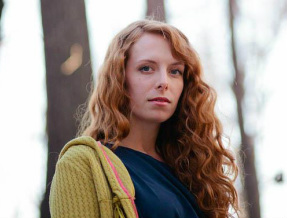 CARLY J. BALES Carly J Bales is an actor, producer, media designer, and generally multi-disciplinary artist residing in the District. She is the Artistic Director of EMP, a multimedia arts collective and theatre space in downtown Baltimore. “A hub of artistic activity” that was voted Best Arts Collective in 2012 (Baltimore CityPaper), EMP has been lauded as one of the boldest “visions to change Baltimore” (Baltimore Magazine). As an artistic director, her focus lies in new work development and devised performance for the theatre. From post-apocalyptic wastelands to nightmarish dreamscapes to immaculate rabbit conception, her work at EMP isn't afraid to "go weird".  JESSICA BURGESS Jessica Burgess is the founding Artistic Director of The Inkwell, Washington DC’s resource for new plays and new play development. Her directing credits include productions at Active Cultures (Constellation, Petri Dish Circus), Actors Theatre of Louisville’s Humana Festival (Clarisse and Larmon, Mr. and Mrs.), Adventure Theatre (The Snowy Day, The Ugly Duckling), Catalyst Theater Company (The Flu Season), the DC Beckett Centenary Festival (Come and Go, Rough for Radio II), Forum Theatre (The Language Archive, Kid-Simple: a radio play in the flesh), Hatchery Festival (Snow Falling Fast, Playing House), Round House Theatre’s Kitchen Series (Cherry Smoke), Rorschach Theatre (The Beard of Avon), Solas Nua (The Drunkard, Portia Coughlan), Theater Alliance (Here’s to the Ladies), Theatre Lab (To Kill a Mockingbird, The Cherry Orchard), and The Inkwell (OK). She has directed developmental workshops and staged readings at Active Cultures, Texas State University’s Black & Latino Playwrights Conference, Catalyst, eXtreme eXchange, Hatchery Festival, The Hub, Theatre J, Woolly Mammoth’s PlayGround, Washington Shakespeare Company, Young Playwrights Theatre, and The Inkwell. She has worked as a Teaching Artist at Theatre Lab, Imagination Stage, and Duke Ellington School of the Arts. She has held staff positions at Round House Theatre, Olney Theatre Center, and Woolly Mammoth Theatre Company. She has sat on the Board of Directors of Active Cultures Theatre, on Forum Theatre’s Artists’ Council, and on the Round House Theatre Artists’ Roundtable. She is a proud alumna of Middlebury College and the 2005 Lincoln Center Directors’ Lab. 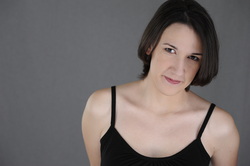 CECILIA CACKLEY Cecilia Cackley is the founding Artistic Director of Wit's End Puppets, a DC company devoted to telling stories through puppetry. Cecilia has been experimenting with string, shadow and hand puppets for more than ten years. As a puppeteer, she has worked with GALA Hispanic Theatre, the O’Neill Puppetry Festival, the Avignon Off and the Source Theater Festival. Cecilia has directed for the Capital Fringe Festival, Young Playwright’s Theater, Rorschach Theatre and The Inkwell. She taught third grade in the public schools for six years and currently works as a teaching artist for Young Playwright's Theater, The Theater Lab, Encore Stage and Studio and Imagination Stage. Cecilia holds a BA in Interdisciplinary Studies and Elementary Eduaction from the College of William and Mary. She is a proud company member of GALA Hispanic Theatre and Young Playwright’s Theater. 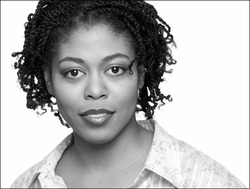 DANIELLE A. DRAKES Danielle A. Drakes previously directed Breath, Boom and Miss Evers' Boys with the Department of Theatre Arts. Ms. Drakes is a two-time Theatre Communications Group Nathan Cummings, Young Leaders of Color Award recipient and Founder & Producing Artistic Director of theHegira Theatre Company. Professional acting credits include: Ford's Theatre, Arena Stage, Baltimore's Center Stage, The Contemporary American Theatre Festival, The Kennedy Center, Round House Theatre and African Continuum Theatre, Imagination Stage, Discovery Theatre, and Woolly Mammoth Theatre Company. Currently, Ms. Drakes is the full time Education Outreach Coordinator at the Folger Shakespeare Library. Prior to her joining the Folger she worked as an artist/educator at American University, Bowie State University, Howard University, Montgomery College, The Baltimore Shakespeare Partnership, The Drama Learning Center, Round House Theatre Education & Outreach, The Theatre Lab, and Young Playwright's Theater. She is a Helen Hayes Awards judge and has joined theatreWashington's newly formed Education Advisory Panel. She received her BA from Goucher College and MFA from The Catholic University of America and is a proud member of Actor's Equity Association and the Stage Directors and Choreographers Society. 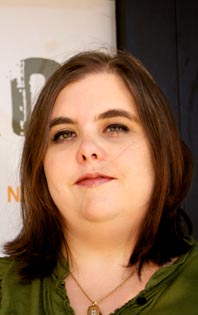 JENNY MCCONNELL FREDERICK Jenny McConnell Frederick is the co-Artistic Director of Rorschach Theatre. She founded the company in the summer of 1999 with Randy Baker. For Rorschach, she has directed Voices Underwater, Dead City, This Storm is What We Call Progress, Rough Magic, The Arabian Night, The Scarlet Letter, Master and Margarita, A Clearing in the Woods, The Illusion and the Helen Hayes nominated God of Vengeance. She has also directed at the Source Theatre Festival and at Virginia Commonwealth University. Jenny has produced dozens of plays, readings and special events for Rorschach Theatre. She’s a member of the Cultural Development Corporation’s Mead Theater Lab Advisory Panel and The Hub Theatre’s Advisory Board. She produced Woolly Mammoth Theatre Company’s Size Matters reading series for three seasons as well as the theatre component of 2003′s Art-O-Matic. Jenny was a nominee for the Women’s Information Network’s Young Women of Acheivement Award in 2001. Jenny grew up in Northern Virginia and graduated cum laude from Virginia Commonwealth University with a BFA in Theatre. She is married to sound designer Matthew Frederick and is currently the Producer for Cultural Development Corporation’s Source Festival and Mead Theatre Lab Program. 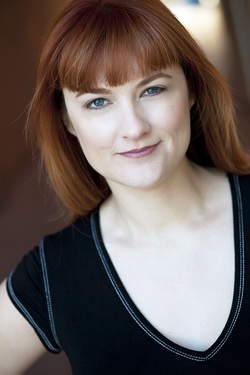 ALLYSON HARKEY Allyson Harkey is Co-Artistic Director of Pinky Swear Productions, a theatre company that produces modern plays with strong, engaging women’s roles where people talk to each other and things happen. An actor and singer, Allyson has performed in numerous Pinky Swear productions, including Killing Women, Carol’s Christmas, Be Here Now, Freakshow, Cabaret XXX: Love the One You’re With, and audience favorite Cabaret XXX: Les Femmes Fatales. She has also worked with Taffety Punk, Factory 449, the Library of Congress, Venus Theatre Company, Rorschach Theatre, Cherry Red Productions, and Landless Theatre Company, among others. Originally from Atlanta, Allyson studied at the University of California, Berkeley, DeKalb College, and Mary Washington College. She has lived in Washington, DC, since 2000 and thus dreams of a time when she can winter in the Caribbean.  NICOLE JOST Nicole Jost is the Artistic Director of Young Playwrights’ Theater (YPT), the only professional theater in Washington, DC dedicated entirely to arts education. Nicole is a playwright, teaching artist, producer and director. She has worked locally with The Inkwell, dog & pony dc, Forum Theatre, City Artistic Partnerships, Madcap Players and Roundhouse Theatre. Her play The Terror Fantastic was read as part of the inaugural DC Queer Theatre Festival in 2012, featured in The Inkwell’s “Evening of Inklings” (April 2012) and “Through a Glass, Darkly” showcase (December 2012) and recognized as a finalist for the 2013 Source Festival. She received her BA in Theater and Cultural Politics from the University of California Santa Cruz, Phi Beta Kappa. In 2011, Nicole was recognized by The Washingtonian as one of ten “Women to Watch.” She is an alumna of DC Public Schools and YPT’s In-School Playwriting Program. 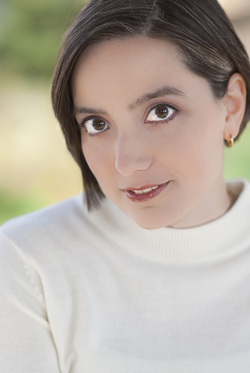 CHRISTINE LANGE Christine Lange is the Artistic Director of Grain of Sand Theatre. She has been active in DC theater for over a decade as a director, performer, and stage manager. Recent productions include - Directing: Raising Cane (2012 Capital Fringe Festival), The Fairy Tale (staged reading, Grain of Sand Theatre), Four Dry Tongues (2011 Madcap Winter Carnival), The Bacchae (2008 Capital Fringe Festival), The Ghost Sonata, Anne of the Thousand Days, The Trestle at Pope Lick Creek, and James Lapine's Twelve Dreams. Acting: You Can't Get a Decent Margarita at the North Pole (Rita), Socrates the Lover(Heraklides/Chorus), Frankenstein (Elizabeth), The Underpants (Louise), Oleanna (Carol), Richard III (York), The Taming of the Shrew (Bianca), and Romeo and Juliet (Benvolio/Apothecary). Film: Shotgun Mythos (Avery). Christine holds a BA in Theater from George Mason University. 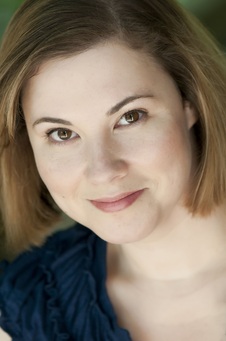 KAREN LANGE Karen Lange is an actor, singer, improviser, and Co-Artistic Director of Pinky Swear Productions. Selected credits: Cabaret XXX: Love the One You’re With, Killing Women, Carol's Christmas, Cabaret XXX: Les Femmes Fatales, Be Here Now and Freakshow (Pinky Swear Productions), Romeo and Juliet (Red Eye Gravy Theater Company), Life with Father (American Century Theater), House of Blue Leaves (Dominion Stage), Wonder of the World (Port City Playhouse). Karen has been performing with Washington Improv Theater's iMusical, since 2006, performing in over 150 shows. She is also part of the DC/NY musical improv troupe Vox Pop, who can be seen in festivals around the country. Karen is a graduate of the Studio Theater Conservatory. She teaches improvisation and musical improvisation at Washington Improv Theater and Studio Theater. 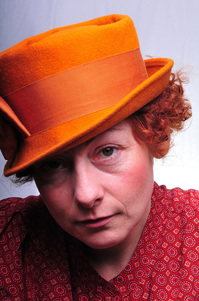 SABRINA MANDELL Sabrina Mandell is the founder, manager and Artistic Co-director of Happenstance Theater. She has written, produced and performed prolifically since the company's founding in 2006. Works include Prufbox, The Seven Ages of Mime, FarFar Oasis, Look Out Below!, Vaudeville's Late Bloomers, and 3 versions of Cabaret Macabre. Capital Fringe Festival hits have included Low Tide Hotel (voted Best Comedy 2007), Manifesto! (2008 Capital Fringe with a subsequent run at the New York Clown Theatre Festival); Cabaret CooCoo (Best Comedy, 2009), and Handbook for Hosts. Sabrina performs regularly with the Big Apple Circus’ Clown Care Program in DC and Baltimore, and at the Maryland Renaissance Festival. She is also a visual artist and poet. 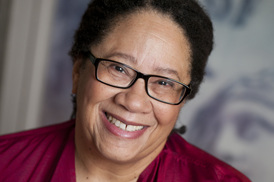 JENNIFER L. NELSON Jennifer L Nelson is currently Director of Special Programming at Ford’s Theatre. Prior to this appointment she was the founding Producing Artistic Director of the African Continuum Theatre Company, Washington D.C.’s only professional black theatre company. During that eleven year tenure, she produced twenty plays, multiple readings and other events. Ms. Nelson is a commended playwright and published poet. Her musical play Torn from the Headlines was awarded the 1996 Helen Hayes/Charles MacArthur Award for Most Outstanding New Play. Her three-minute telephone play Somebody Call 911 was commissioned by and featured at the 2001 Humana Festival at the Actors’ Theatre of Louisville. Her latest full-length play 24, 7, 365 was produced by Theatre of the First Amendment. Her full-length musical Hubert & Charlie was honored by the 2003 Larry Neal Writers’ Awards and was subsequently produced by the African Continuum Theatre. She has received several commissions to write issue-oriented plays for young audiences, most recently by Ford’s Theatre to bring to life historical character Elizabeth Keckly (2011 Washington Post Helen Hayes Theatre Award). She has also been commissioned to write short plays for the Theatre Lab; Active Cultures as part of their Sportaculture Festival; the Cultures-in-Motion Program of the National Portrait Gallery; the Education Department of the Corcoran Gallery; the Kennedy Center Program for Families; and Round House Theatre’s HeyDay Players. She is a three-time grantee of the DC Commission on the Arts Individual Artist program, and a recipient of the Mayor’s Arts Awards for Excellence in an Artistic Discipline. As a director, her recent productions include Raisin in the Sun at Everyman Theatre in Baltimore;Necessary Sacrifices at Ford’s Theatre; The Whipping Man at Theatre J. Upcoming productions include: 9 Circles for Forum Theatre and Top Dog/Underdog for Everyman Theatre. 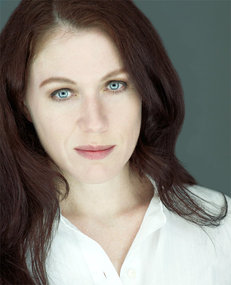 HELEN PAFUMI Helen Pafumi is the Artistic Director and co-founder of The Hub Theatre. Since the Hub's inception Helen has produced several world premier plays, multiple area premiers, an annual free staged reading series and commissioned original work from area artists. Her original plays have been produced by The Hub, and been seen at the Kennedy Center's Page to Stage Festival. In addition to her role at The Hub, Helen works as an actor in many DC area theatres, including Folger Theatre, Woolly Mammoth, Theatre J, Forum Theatre, Theatre Alliance, Rorschach Theatre, Keegan Theatre, The Inkwell, the Source Festival, and the Beckett Centenary Festival. She has appeared in numerous independent films and area commercials. Helen also does dialect coaching for George Mason University’s theatre program and coaches acting and public speaking. Helen holds a BA in Theatre from Virginia Tech. She has been nominated for a Helen Hayes Award in Outstanding New Play for her co-adaptation of Wonderful Life. She is the recipient of the Puffin Foundation Award and the Washington Canadian Partnership Award. 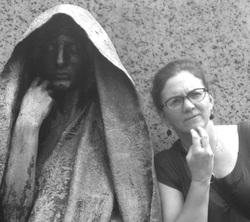 MARY RESING Mary Resing, the artistic director of Active Cultures Theatre, is a playwright, director & dramaturg. The Maryland State Arts Council recognized her in 2012 with an Individual Artist Award in Playwriting for her signed/spoken musical Visible Language. Her work has been seen around the country at Actors Theatre of Louisville, Hartford Stage, Ann Arbor Rep, Empty Space, New Dramatists, Arena Stage, Woolly Mammoth, and Source Theatre Company. A proud alumna of Michigan-Ann Arbor (Ph.D.Theatre), NYU (M.A. Performances Studies) and Spring Hill College (B.A. Humanities), Dr. Resing was a 2005-2006 US Fulbright Scholar to Armenia. She has served on panels for the Theatre Communications Group, Fulbright/CIES and The Rockefeller Foundation. Dr. Resing received a 2009 Individual Artist Award in playwriting from the Prince George’s Arts Council and 2005 Offstage Award in Dramaturgy from the League of Washington Theatres. She is the COO and co-owner with Tim McKeown of the highly successful startup firm ResingMcKeown, Inc. She believes local theatre is fresher, tastes better and is good for the local economy. 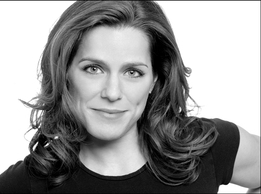 SUSAN MARIE RHEA Susan Marie Rhea is the Associate Artistic Director of The Keegan Theatre, where she is also a company member and sits on the Board of Directors. During her tenure at Keegan, Susan has directed All My Sons (opening November 2012), The Crucible, One Flew Over the Cuckoo’s Nest, Elizabeth Rex, A Man for All Seasons, Agnes of God, and True West. Working alongside her husband, Keegan’s founder and artistic director Mark A. Rhea, Susan has co-directed the musicals Spring Awakening, National Pastime (a world premiere), and RENT, which was nominated for five Helen Hayes awards, including Outstanding Direction and Outstanding Resident Musical. As a member of Keegan’s acting company, Susan’s credits include Barbara in August: Osage County, Valerie in The Weir, Lorna Moon in Golden Boy, Belinda in Noises Off, Maggie in Dancing at Lughnasa, Carla in Lincolnesque, Maire in Translations (Helen Hayes nomination, Outstanding Ensemble), Stella in A Streetcar Named Desire (Ireland/U.S.), Maggie in Cat on a Hot Tin Roof (Ireland/U.S.), Laura in The Glass Menagerie (Ireland/U.S.), and Beth in A Lie of the Mind, among many others. Through Keegan’s outreach programs, Susan has worked with local youth on theater productions for more than a decade, raising money for Habitat for Humanity and other community projects. Susan received her post-graduate theatre training at Circle in the Square (NY/NY). 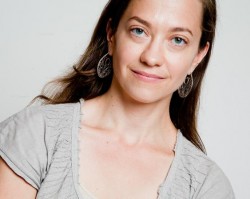 SHIRLEY SEROTSKY Shirley Serotsky is the Director of Literary and Public Programs at Theater J, where she directed the 2011 production of The History of Invulnerability; The Moscows of Nantucket; Mikveh (which received two Helen Hayes Nominations for Best Actress); and The Rise and Fall of Annie Hall (which received a 2009 Helen Hayes Nomination for Best New Play). She works as a freelance director in the DC area and beyond, and is particularly interested in the development of new work. Recent directing credits include: a 21/24 Signature Lab Workshop presentation of The Break (Signature Theatre); Working: The Musical(Keegan Theatre); Blood Wedding (Constellation Theatre); Birds of a Feather (which won the 2012 Charles MacArthur Helen Hayes Award for Outstanding New Play—at The Hub Theatre); Juno and the Paycock (Washington Shakespeare Company); a staged reading of Bengal Tiger at the Baghdad Zoo for the National New Play Network at Arena Stage; This is Not a Timebomb (The Source Festival); Reals, Five Flights and Two Rooms (Theater Alliance); Crumble (Lay Me Down Justin Timberlake) and We Are Not These Hands (Catalyst Theater); References to Salvador Dali Make Me Hot (Rorschach Theater, for which she received a 2007 Helen Hayes nomination for outstanding direction); Sovereignty (The Humana Festival of New Plays); Cautionary Tales for Adults and the Many Adventures of Trixie Tickles (2007 CapFringe); LUNCH (2007 New York Musical Theater Festival & 2006 CapFringe), Titus! The Musical. (2009 Capfringe and Source Theatre). Training: BFA, North Carolina School of the Arts. Shirley was a member of the 2002 Designer/Director Workshop with Ming Cho Lee; the 2003 Lincoln Center Director's Lab; and was a 2001/2001William R. Kenan, Jr. Fellows at the Kennedy Center. 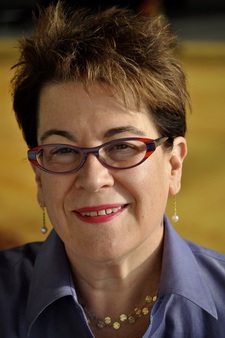 MOLLY SMITH Molly Smith has been instrumental in leading the reinvention of Arena Stage, focusing on the creation of the new Mead Center for American Theater as well as major artistic changes. Arena Stage is a center for the production, presentation, development and study of American theater. Ms. Smith has been a leader in new play development for 30 years while at Arena Stage for the past 14 years and at Perseverance Theatre in Alaska, the theater she founded and led for 19 years. She is a great believer in first, second and third productions of new work and has championed projects like Next to Normal, How I Learned to Drive and Passion Play, a cycle. Ms. Smith has directed for Arena Stage Cat on a Hot Tin Roof, How I Learned to Drive, Hot ‘N’ Throbbing, All My Sons, The Great White Hope, Coyote Builds North America, Agamemnon and His Daughters, A Moon for the Misbegotten, South Pacific, An American Daughter, Camelot, Orpheus Descending, Anna Christie, Passion Play, a cycle, Damn Yankees, Cabaret, The Women of Brewster Place, Christmas Carol 1941, Legacy of Light, Light in the Piazza, Oklahoma!, The Book Club Play, and The Music Man. She has worked alongside playwrights Sarah Ruhl, Paula Vogel, Tim Acito, Karen Zacarías, John Murrell, James Magruder, Barry Lopez and many others. Ms. Smith’s directorial work has also been seen at the Shaw Festival in Canada, Berkeley Repertory Theatre, Trinity Repertory Company, Tarragon Theatre in Toronto and Centaur Theatre in Montreal. 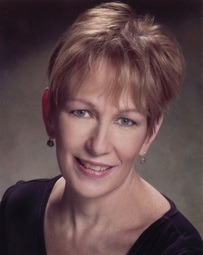 JANET STANFORD Janet Stanford has helped transition Imagination Stage from a community-based arts organization to a nationally significant regional theatre for young audiences and arts education program. She has commissioned dozens of American and international playwrights whose plays and musicals have gone on to receive awards and be produced all over the country. Janet travels widely on grants to Europe, South America and Canada seeking artists to work with Imagination Stage. Most recently, she has introduced Theatre for the Very Young to the USA with funding from the Theatre Communications Group and has helped devise two new pieces for the program as well as bringing in other TVY artists from Italy, England and Germany. Janet is also a playwright whose The Lion, the Witch & the Wardrobe, created in collaboration with The Washington Ballet, broke all box-office records this past summer. As a director she was pleased to be nominated as Best Director for her recent production of Dr. Dolittle. 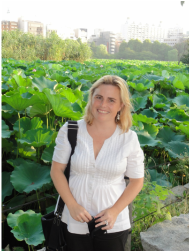 ALLISON ARKELL STOCKMAN Allison Arkell Stockman is the Founding Artistic Director of Constellation Theatre Company, which performs at Source, 1835 14th St. NW. She has directed 16 of their productions including Metamorphoses, The Ramayana, The Green Bird, Taking Steps, Women Beware Women, Three Sisters, A Flea in Her Ear and The Arabian Nights. She will direct Gilgamesh this coming spring. Locally, Allison has served as an Assistant Director at the Folger Theatre and Shakespeare Theatre Company. She has directed readings and workshops for Theater J and the Kennedy Center. A Drama League Directing Fellow and a member of the Lincoln Center Theater Directors Lab, Allison holds an MFA in Directing from Carnegie Mellon School of Drama and a BA in Comparative Religion from Princeton. 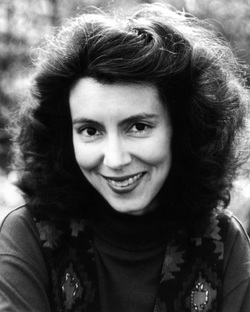 MARY HALL SURFACE Mary Hall Surface is a playwright and director specializing in theatre for families and multi-disciplinary collaborations. A DC theatre community member since 1989, her producers include Round House Theatre, Arena Stage, Folger Theatre, the National Gallery of Art and over 15 productions at the Kennedy Center. Internationally her work has been featured in productions and festivals in Germany, Canada, Japan, Peru, France, Taiwan, Sweden and Ireland. Nominated for four Charles MacArthur Award for Outstanding New Play and five Helen Hayes Awards for Outstanding Direction, she received the 2002 award for her musical, Perseus Bayou. She is the artistic director of INTERSECTIONS: A New America Arts Festival at the Atlas Performing Arts Center. She received the Charlotte Chorpenning Award, presented by the American Alliance for Theatre and Education for an Outstanding Body of Work as a Playwright, May 2006. She was a finalist for the 2011 DC Mayor's Arts Award for Service to the Arts. 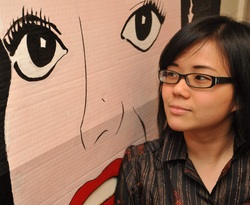 CARMEN C. WONG Carmen C. Wong is the founding Artistic Director and agent provocateur of banished? productions, an avant-pop performance collective that plays with narrative while creating immersive art experiences. Her projects have been fueled by awards such as the Creative Communities Fund (2012), TCG Global Connections (2011) and the DCCAH's Young Artist Award (2010). Current projects and concepts include the devised dance collage Into the Dollhouse; a sensory gastro-art-performative series that has spun Tactile Taste of Helsinki / Tactile Dinner Morsels / Tactile Dinner Car / A Tactile Dinner; the ballades mechaniques installation series of story-telling machines, and the banished? footsteps series of alternative art audiowalks. Carmen first got her start in interdisciplinary performance in Berlin, working on Constanza Macras’ & Dorky Park’s “Back to the Present” in 2003. She currently sits on the Board of Directors of CityBlossoms, an urban gardening organization, and is on the Board of Governors for Theatre Washington which runs the annual Helen Hayes awards in Washington, DC. When not busy making works that defy easy categorization, she secretly enjoys picking up languages just to make untranslatable puns. 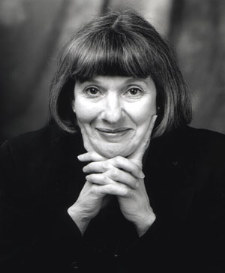 JOY ZINOMAN Joy Zinoman (Director) Joy Zinoman is the Founding Artistic Director of The Studio Theatre, where she directed over 70 productions, including A Number by Caryl Churchill for which she received the Helen Hayes Award for Outstanding Direction. She also received The Washington Post Award for Innovative Leadership in the Theatre Community. Last year she directed Sounding Becket at CSC Rep in New York and is about to direct 4000 Miles at The Studio Theatre. She received the Helen Hayes Award for Outstanding Director for Tom Stoppard’s Indian Ink, and has lead The Studio theater through 178 productions which have garnered 225 Helen Hayes Nominations. Ms. Zinoman has received nine Helen Hayes Award Nominations for Outstanding Direction. Recent credits include Moonlight, The Year of Magical Thinking, Rock ‘N’ Roll, The Road to Mecca, The History Boys, Shinning City, Pillowman and American Buffalo, her final production before retiring as Studio Theatre’s Artistic Director. Her numerous honors include the Mayor’s Art Award for Excellence in an Artistic Discipline and the Washingtonian of the Year Award. She is Founder and Master Teacher of the Studio Theatre Acting Conservatory, now in its 38th year, along with Studio’s 2nd Stage program for emerging theatre artists. 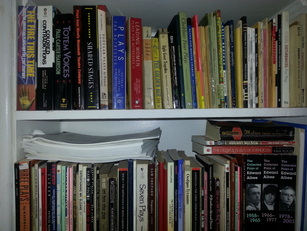 "There is no “national theatre” in American theatre because our theatre is defined not by a single place, but by singular people, crisscrossing our country like fireflies, with each particular twinkle contributing to the light of the whole." ~Teresa Eyring TCG Executive Director In the Fall of 2006, I worked as the Allen Lee Hughes Fellows and Intern Program Coordinator at Arena Stage. At our first all staff meeting, we were divided into several groups of five or six and tasked with planning a season for Arena Stage. For this exercise, we had to be mindful of the Mission Statement, the demographics of the audience and the production history of Arena Stage as well as other area theaters going back seven years. We also had to consider when each show would run and select the performance spaces. What's more, the five or six of us had to come to a consensus. After twenty minutes or so, we presented our seasons to everyone and shared our artistic vision. It was an arduous, complex and exhilarating exercise, and an absolutely brilliant introduction to the spirit, passion and vision of the theatre. What's more, it taught me one of the most lasting and valuable lessons that I have learned about theatre thus far: Season planning is hard and so is being an Artistic Director. Here is how culture reporter, Robin Progrebin, describes season planning in her article, Building a Theatrical Season, Month by Month: "A nonprofit theater's season planning is a craft all its own, one of mundane logistical maneuvering as well as lofty creative ambition; of sleepless-night angst and pride-swelling triumph; of big-picture matters like building audiences and details as precise as choosing a hat. It's a balancing act of egos, schedules, budgets and creative visions. The planning is conducted at many levels, depending on an institution's finances. And it almost always involves a deep and consuming commitment of passion and time." Since my time at Arena Stage, I've gone on to select plays for theatre seasons and new play development festivals. It's always a challenging, passionate and tiresome endeavor. When theatres announce their seasons, I can't help but applaud, herald and champion the accomplishments of their selections. I know how challenging it was to bring together those 3 to 6 plays, plus additional programming. I know how hard it was to say no to the countless number of plays and playwrights they wish they could have included. Here's a short list of what has to be considered when selecting plays for a season:
For theaters with diversity and inclusion embedded in their mission and values, the following will be reflected in their decisions:
When Theater J decided to produce the world premiere of my play THE HAMPTON YEARS, they hit the jackpot: I'm an (1.) emerging (2.) D.C. based, (3.) woman playwright (4.) of color who wrote a play about (5.) Black and Jewish relations in the arts, military and academia. WooHoo! But even before they established the amazing Locally Grown Festival, now in its second year, Theater J has had a long, rich, and deep commitment to diversity and inclusion. Their continued investment and inclusion of local playwrights makes it really exciting to be a part of the 2012-2013 D.C. Theatre Season. As more and more theatres work to include emerging and local playwrights in their seasons, I am reminded that the very best theatre seasons introduce a wide, more diverse and inclusive, range of plays to their community. It is essential for the vitality, growth, and health of the community that they continue doing so. I'm appreciative that there is no national theatre in the U.S. and that playwrights across the nation are encouraged to write in their own voices, styles, and rhythms about any and everything that moves them. By no means is it a perfect system and it sure takes a while to find your tribe of people, but as an audience member, theatre artist and lover of the theatre:
Basically, I want it all. And this, ladies and gentlemen, is yet another reason why it is so extraordinary to be a theatre artist living and working in the D.C. Theatre community. In my next post and over the course of the next several days, I'm going to introduce you to the amazing, brilliant and talented Women Artistic Directors of D.C. being featured in this series. I'm so excited and can hardly wait to share these deeply powerful and moving stories with you. Please stay tuned! |
My BlogI'm a playwright, dramaturg, and teaching artist. It is here where you'll find my queries and musings on life, theater and the world. My posts advocate for diversity, inclusion, and equity in the American Theatre and updates on my own work. Please enjoy!
Categories
All
Archives
June 2020
Reading List
|
